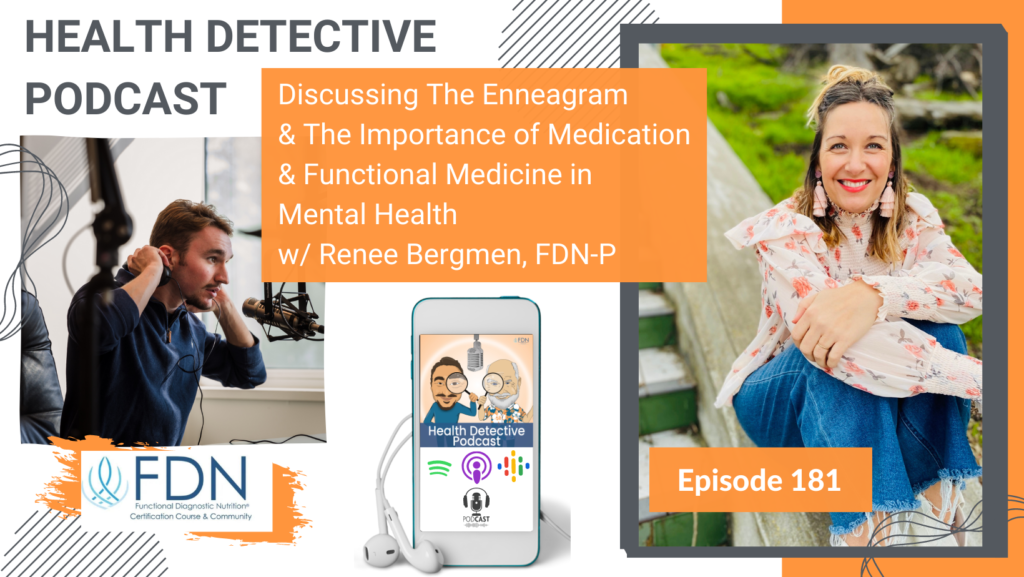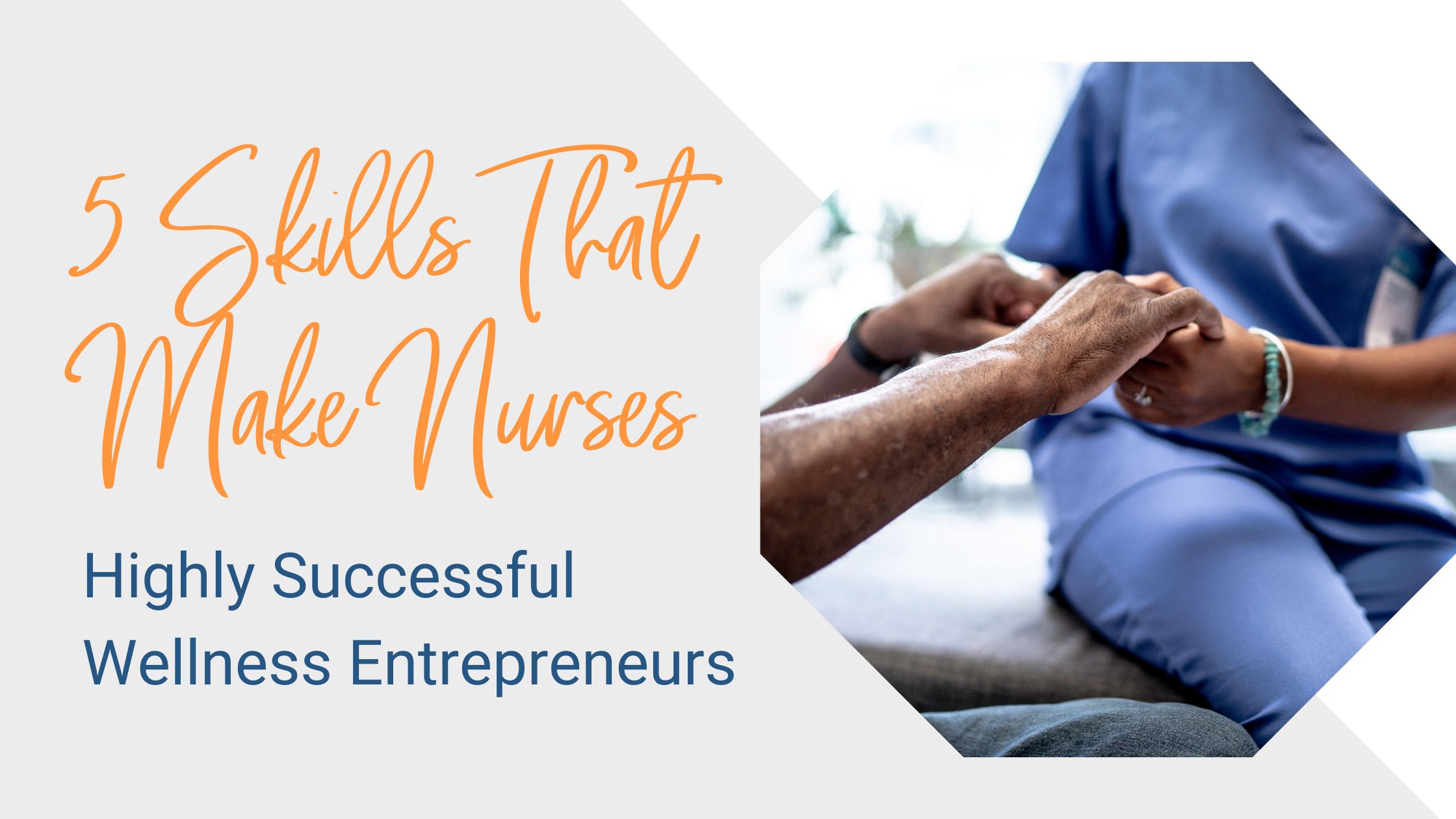Introduction
[00:00:00] Detective Ev: Well, hello my friends. Welcome back to another episode of the Health Detective Podcast by Functional Diagnostic Nutrition. My name is Evan Transue, aka Detective Ev. I will be your host for today’s show concerning mental health.
We are bringing back someone for the second time, her name is Renee Bergman. If you remember her episode, congratulations, because you have been listening for quite some time. Renee Bergman was on with us in Episode 61. We talked about quite a few things there. The title was Infected Teeth, Natural Chemo, and the Enneagram. I will have that in the show notes of course, because that’s where you’ll get to hear her full story if that’s something that you’re desiring to do after this podcast.

Today we are back with a slightly different topic, but also a revisiting of another topic that we had discussed quite in-depth last time. That topic was the Enneagram. We basically were totally analyzing the usefulness of this personality typing system. If you know me in person or know me closely online, I’m a huge personality theory nerd.
I love Myers Briggs; I love the Enneagram. I do enjoy the Big Five. I almost feel weird about it because the Big Five has the most scientific data behind it. But that’s the one I am least attracted to. For some reason, I have found so much resolution in problems in my own life through Myers Briggs.
I don’t just mean the letter by letter. I don’t believe the whole, well, my letters can change over time. There’s a whole theory behind this if you really get into the depths of it. It’s based on union analytical psychology by Carl Jung.
The Enneagram Test
He was someone who, obviously, a very famous psychologist, but also theorized that we used these cognitive functions, as he referred to them. And that we use them in specific orders based on what type you were. We can spend a whole episode on that. I’m not here to get into that today. That’s my favorite one.
But I also really like the Enneagram. One of the problems, last time when we talked, Renee and I, at the end of the episode that we did, she was trying to type me because I had been through the tests before. I hadn’t studied that one as in depth, but then I was stuck between two types. So, she did the best that she could.
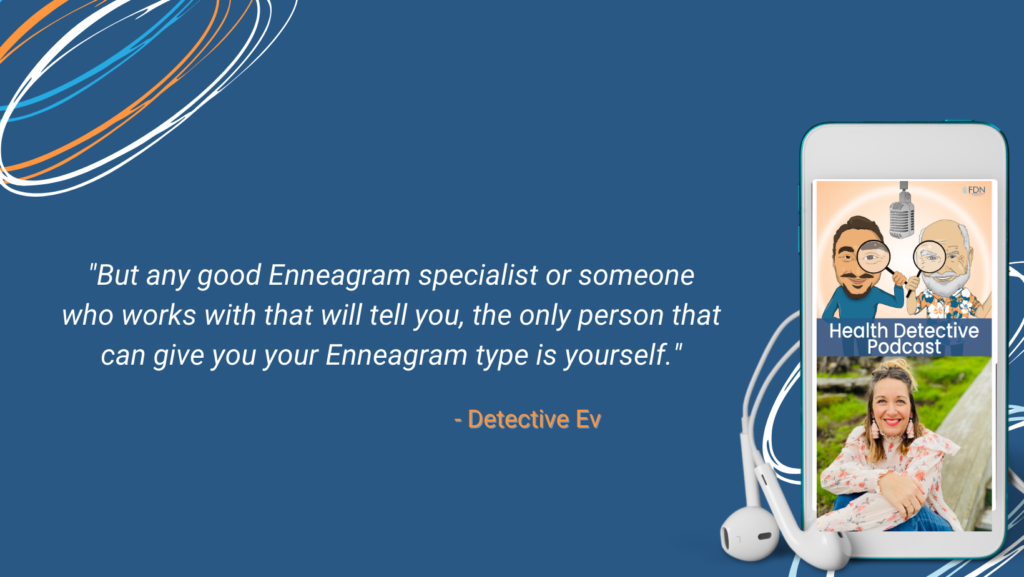
But any good Enneagram specialist or someone who works with that will tell you, the only person that can give you your Enneagram type is yourself. It takes a bit of self-awareness, and I was close. There’s nine types total in the Enneagram. I was stuck between two and it turns out we actually got the one that I am, wrong on that first episode.
I learned which one I am now, my girlfriend helped me with that. It was quite obvious to her. It’s kind of funny how it can be a little more obvious from an outsider’s perspective. Again, we just said this, you need to type it yourself. You’re the only one that can type yourself. But getting that outside influence from someone that I trust, and I know has my best intentions and knows me very well, that was pretty encouraging. I’m like, Okay, I feel like this is pretty solid.
A Health Journey Plus a Personal Development Journey
She presented me with evidence that made me feel very good about this typing and now I can use this to develop myself and work on the areas of my life that need to be worked on.
That’s the whole point of these things. That’s why it relates to what we’re talking about here on the Health Detective Podcast. I don’t want this to sound like just some cool thing that I’m passionate about, but it’s totally irrelevant to the normal content on the show. It’s not exactly.
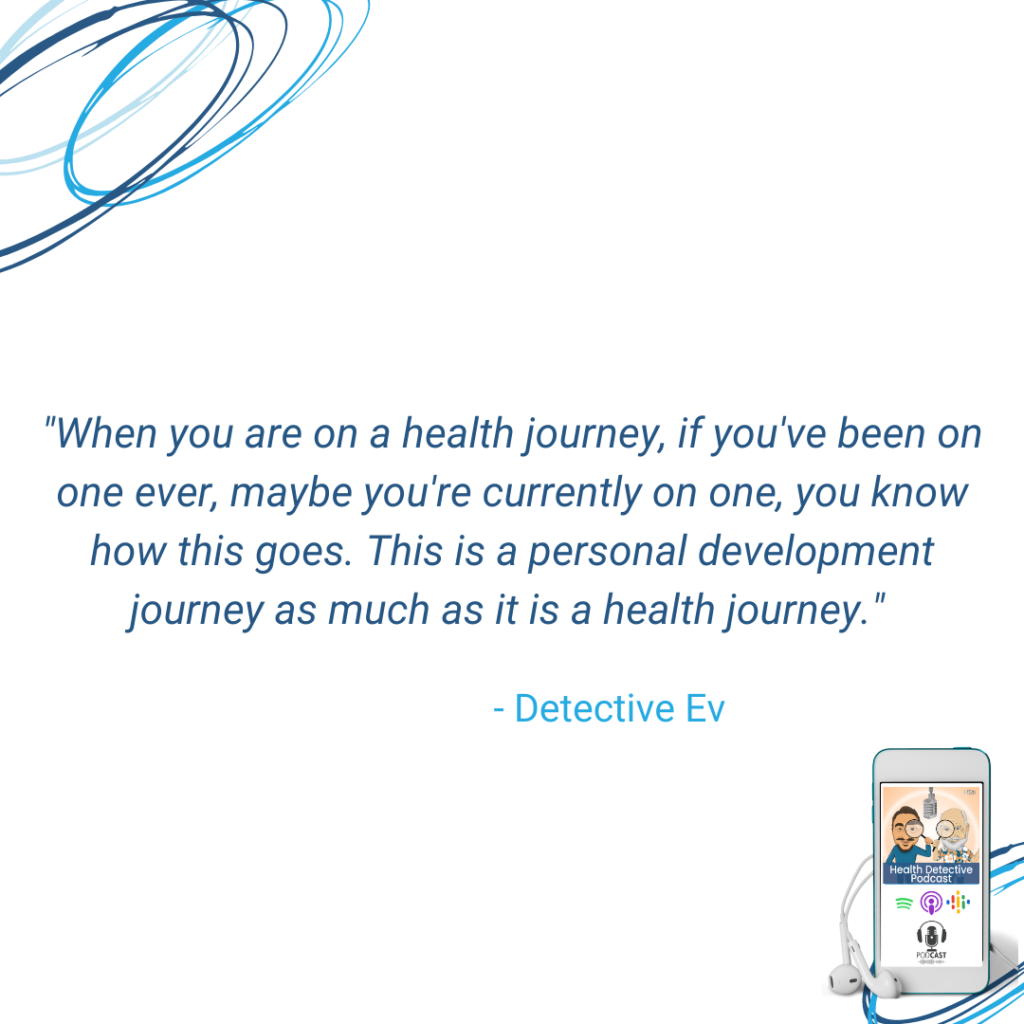
When you are on a health journey, if you’ve been on one ever, maybe you’re currently on one, you know how this goes. This is a personal development journey as much as it is a health journey. I could run all the labs with someone, I could give them the protocols, and in theory, they’re really not that hard to go through. I mean, it takes a lot of knowledge to know what to educate someone on and kind of create a protocol for them. That takes a lot of knowledge.
But in terms of like actually doing this stuff, this isn’t rocket science per se. Most of it’s not. I mean, it’s pretty simple. You gotta eat certain things. You’re going to have to have a certain sleep schedule. You’re going to have to maybe implement some products just to survive in today’s modern world, and you’re going to have to utilize some supplementation probably targeted towards you.
Mental Health Sometimes Gets in the Way of Healthy Living
You might not understand fully what everything is in the beginning. Fine, fair enough. But this is not particularly complicated in terms of the actions. It’s like, can you just take this stuff or eat this way? So, if it’s so simple, how come everyone listening right now knows in practice, it is never that easy. It might be simple, but it’s not easy.
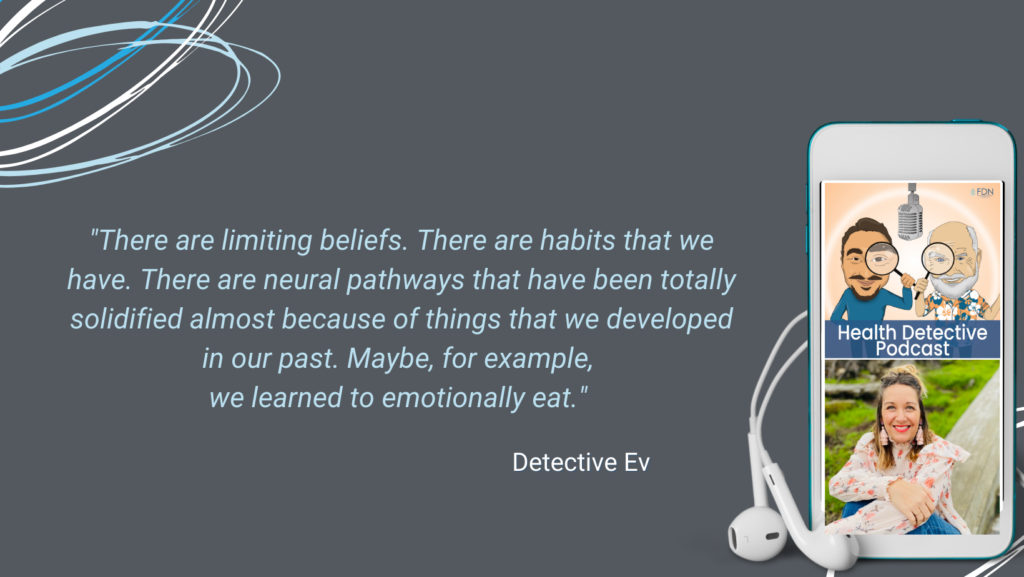
There are limiting beliefs. There are habits that we have. There are neural pathways that have been totally solidified almost because of things that we developed in our past. Maybe, for example, we learned to emotionally eat. Then whenever stress in life comes up, we emotionally eat and self-sabotage.
Okay, so you do well maybe 25 days out of the month and then the other five to six days is a total nightmare because there’s stressful situations going on or things are happening to you. My point in mentioning this, I hope this all makes sense cause I’m about to connect it, is that again, it’s as much a personal development journey, if not more, than it is a health journey.
That means we need good, solid, time-tested tools that can help us on the personal side to get the best results for the health side. Does that make sense? Is the Enneagram the first thing I might use with someone when it comes to the personal development side on a health journey? Not necessarily, but I think it is a very powerful thing to have in one’s pocket.
At the very least, I know you guys are going to enjoy the first part of this conversation because of the passion Renee and I exhibit for this going back and forth.
Functional Medicine, Mental Health, and the Enneagram
I sometimes listen to podcasts where I don’t really know what the people are talking about, but they are so excited about it that that excitement is contagious. You can’t click off. I want to hear more. I’m excited for them. I want to know what they’re talking about and it’s working on me now where I want to learn more about the topic.
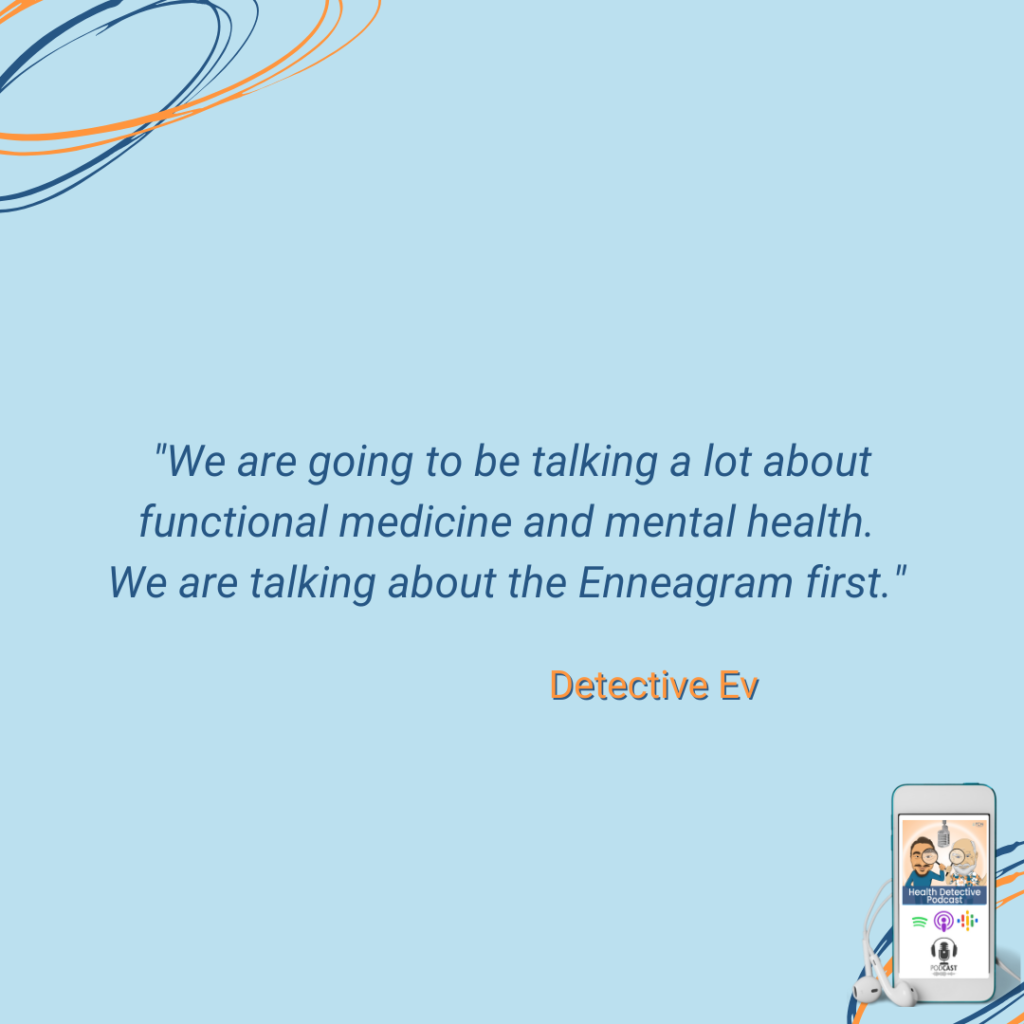
I hope that is your experience in the beginning of this show, but really our core focus today is actually the mental health side. We are going to be talking a lot about functional medicine and mental health. We are talking about the Enneagram first. Like I said, that’ll last about 20 minutes. What we are also doing towards the end of that first part of the conversation is mentioning how the Enneagram can be linked with the mental health side of things.
It’ll all make sense once the episode is completed. I think you guys are really going to like this one. I love Renee. It is very fun to talk to someone I already have rapport with and that I can just bounce back and forth with for hours. Without further ado, let’s get to today’s episode.
All right. Hello there, Renee. Welcome back to the Health Detective Podcast. How are you?
Renee Bergmen: I’m doing great. How about yourself?
Detective Ev: I am doing very well. I was thinking, and I’ll put this in the show notes. The last time you were on, when you came on to tell your story and just how you got into this world of FDN and functional health in general, I’m pretty sure we were the FDN Thrive podcast. That’s how long ago this was. That’s pretty cool to know.
Self-awareness Is Required
When you’re released, it’ll be Episode 181. At that time, it was Episode 61. That’s pretty cool to have you come full circle here. That’s so great.
One thing I gotta address right from the get-go, we’re going to just jump right into it. For those that don’t know, when we have someone on for the second time, it’s when we typically nerd out on just one topic. So, if you guys want to hear her story more than just the bio that I just read, then please check out that Episode 61.
Feel free to listen to it first. I don’t think it’s going to be necessary, but you can feel free to do that. However, we had talked about the Enneagram last time because I am a personality typing nerd. I love Myers Briggs. I love the Big Five. I don’t love DISK. I think it’s interesting. I’m not saying something’s wrong with it, it’s just I never felt as drawn to it. The Enneagram is something that was always appealing to me.
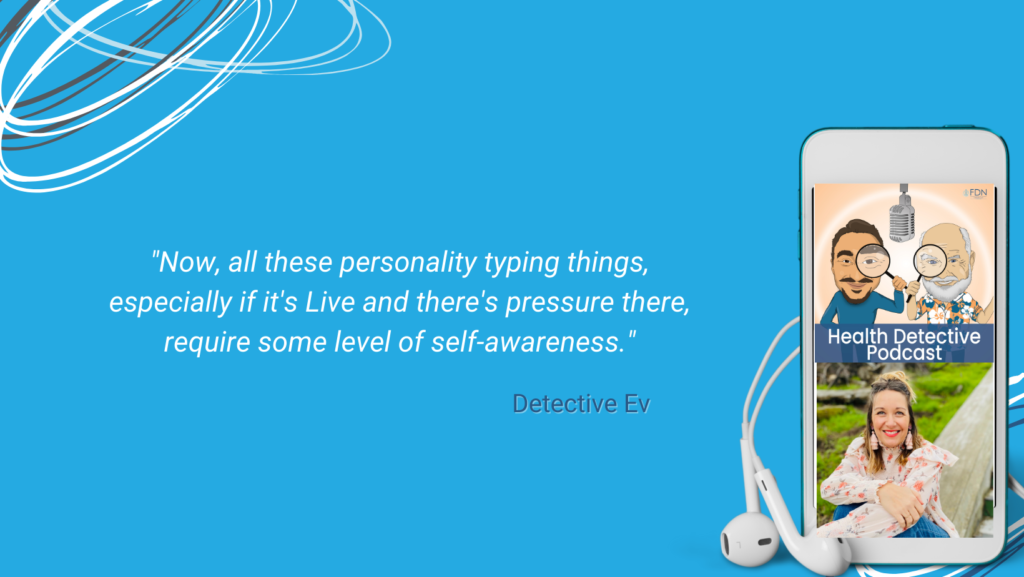
What we ended up doing last time is we attempted a Live typing. Now, all these personality typing things, especially if it’s Live and there’s pressure there, require some level of self-awareness. Again, you probably heard this in the bio, but in case you’re someone that skips intros, Renee specializes in this.
I mean, what do you even call that? I don’t want to misspeak. What is that certification or program or whatever it is?
[00:07:49] Renee Bergmen: I’m Enneagram certified. It’s as simple as that.
[00:07:53] Detective Ev: I don’t know how I haven’t done these yet. I gotta go get the Myers Briggs one and this one. That would just be fun to do.
Lack of Self-awareness
But I remember we were going back and forth between Type 3 and Type 8. We concluded loosely Type 3 because it was based on one question that you asked. I believe the question was, do you think that you make decisions more with, I think you said, thinking or logic versus the heart.
I said, I want to believe it’s like the logic, but it’s probably the heart. Then so we said, Okay, well it’s probably Type 3, but we have some more work to do. I ended up, you know, I went through the Enneagram again, I’ve done some more stuff with it, and I gained self-awareness.
Because it also requires the person to be self-aware, you said that only the person can really type themselves. I don’t know if it’s good or bad, Renee. I think on one side it’s great that I would acknowledge, like the reason I thought I was Type 3 is because of my affinity for the people.
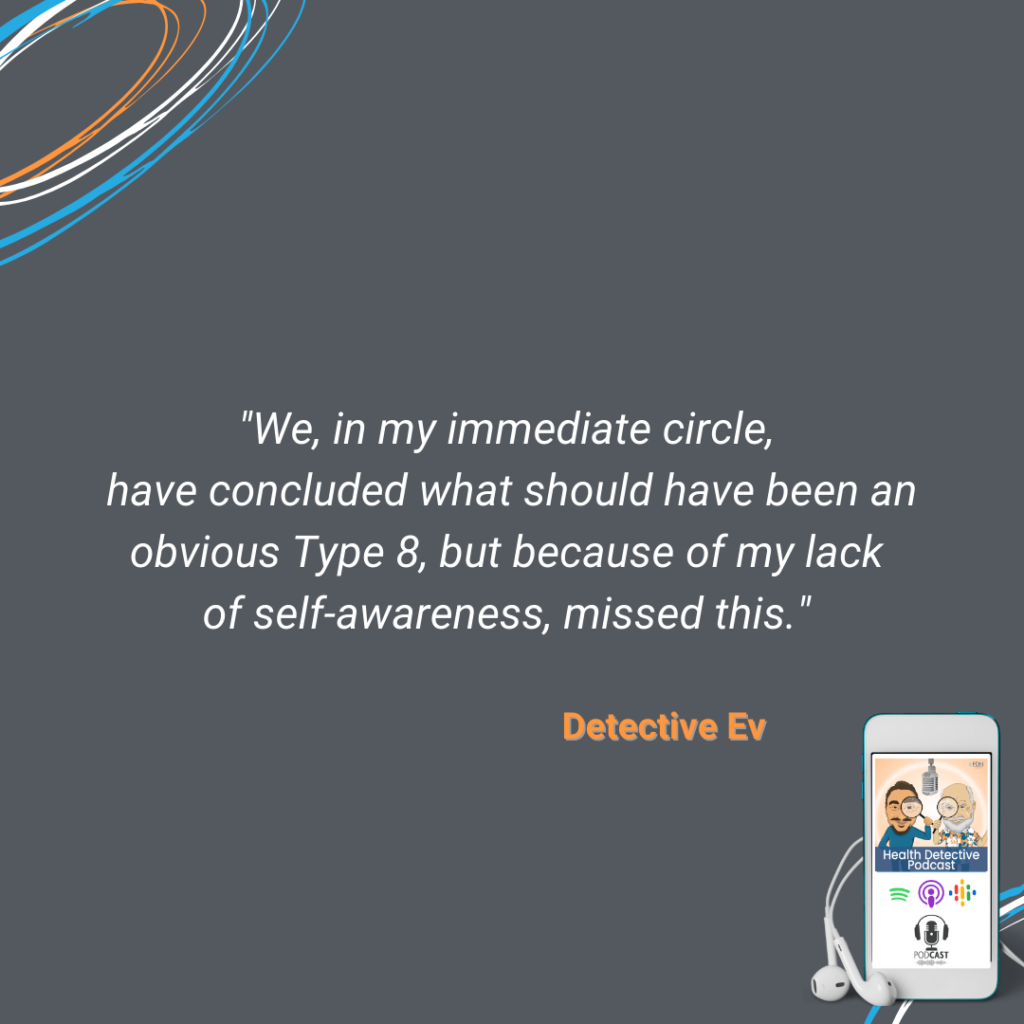
I’ve had plenty of problems being self-conscious in my life. So, I’m glad that I had the awareness there. But I think that was actually at the detriment of awareness for some of my other stuff. We, in my immediate circle, have concluded what should have been an obvious Type 8, but because of my lack of self-awareness, missed this.
When my girlfriend Maddy took this test for me, it scored so high Type 8 compared to the rest, it wasn’t even funny. When she read the descriptions, because she doesn’t have a bias, she didn’t even know what an enneagram was. I showed her Type 3 and Type 8, and she asked me, she said, are you joking?
The Details Behind Detective Ev’s Type
I’m like, what do you mean? She was like, it’s this one and she points to Type 8. She was like, you don’t see that? And I’m like, Wow! Okay, I got some learning to do. Again, I apologize for going off three minutes. I normally would want the guests to talk, but this is unfinished business here. I’m glad to have you back on.
I feel pretty secure in that now. I think I’ve been able to work through a lot of the more negative stuff. But when I look at like admittedly the worst of the worst for the 3 and the worst of the worst for the 8, and I look at where I’ve been in my life, it becomes pretty straightforward. It’s like, okay, obviously the 8 was more involved at that point.
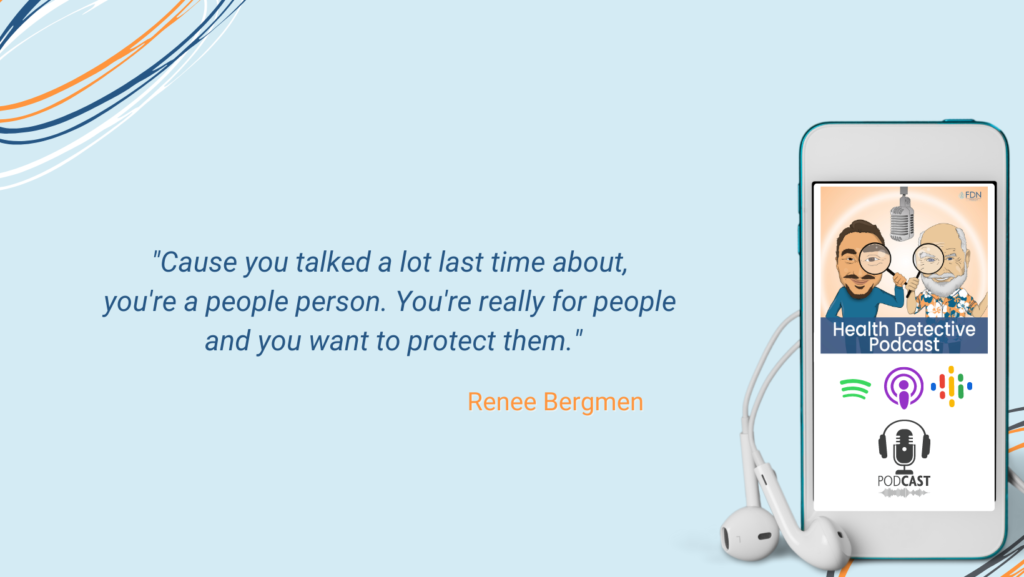
[00:09:42] Renee Bergmen: Yeah. You know, I’d love to hear from her perspective. How did she really see that 8? Is it because of like you’re a protective challenger, that you really try and challenge everyone? Cause you talked a lot last time about, you’re a people person. You’re really for people and you want to protect them. That’s where that conversation went back and forth, 3 or 8.
What specifically stood out to her about you that made her certain you were an 8? Do you know?
[00:10:09] Detective Ev: Well, on the good side, there would be stuff like that, like the protective nature. I mean, this is serious, and I don’t think about how, maybe not strange, but not standard this is.
The Difficulty of Recognizing the Inherent Aspects
I love Maddy, she’s a wonderful woman. I’ve always wanted to do MMA. I am now doing that. My gosh, you have an ability to get me to be very vulnerable immediately. So, for those that have not listened to other episode, you’re probably like, what the heck? But I’m just going to go right into it.
I have such extreme fantasies about what it would be like to not protect someone that I care about, especially in a physical sense. If someone hurt Maddy, and it was because I couldn’t protect her because of physical stature, I would probably have suicidal thoughts because of that. Like, that is my worst fear to have that happen.
It’s enough drive that it’s pushing me. Like there’s personal training right now from a boxer of 20 years. I’m doing wrestling stuff. I just started with my friend; he was a state champ wrestler. Like, I am paying these people decent money, money that I shouldn’t necessarily be spending on that because of that.
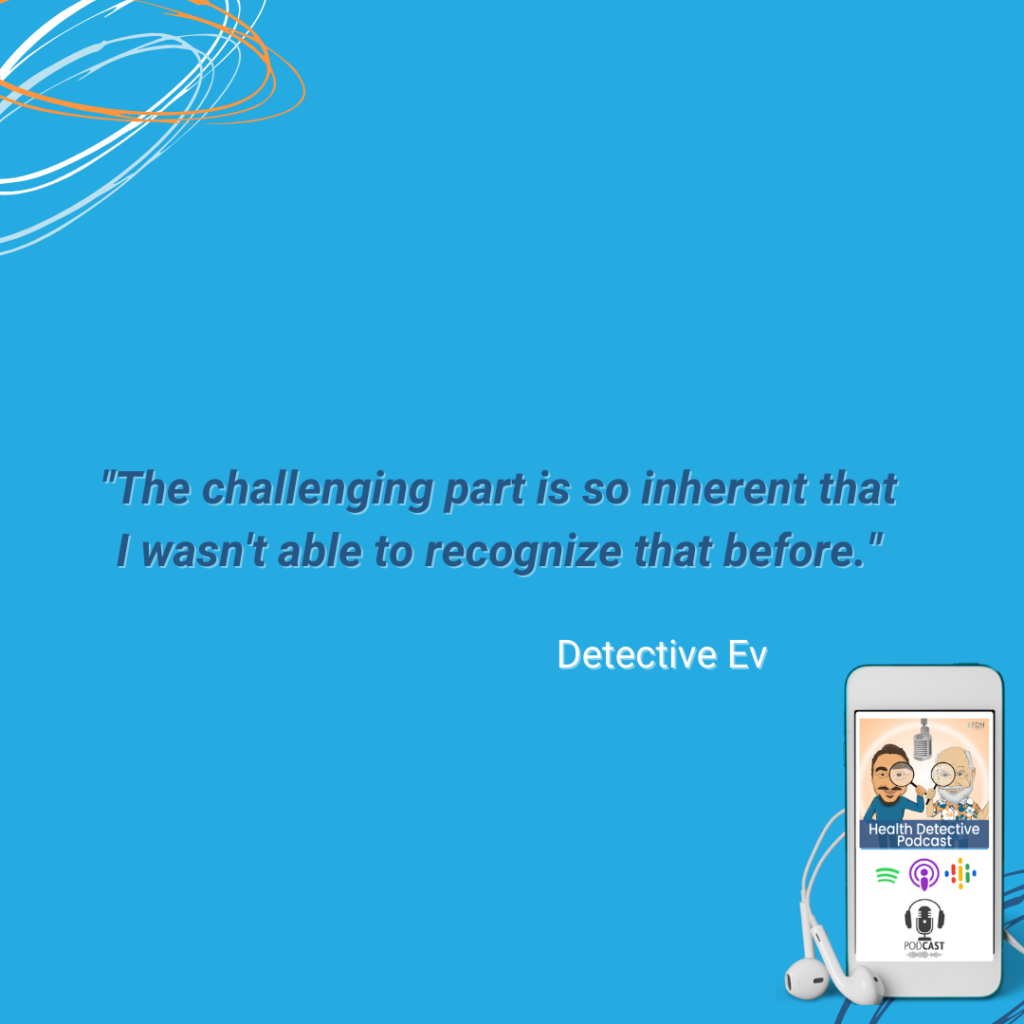
Then on the maybe not so favorable side, but a side I’m willing to admit to, is just the controlling nature. I mean, I have to turn it off in relationships, but it’s still evident. It’s not a secret. The challenging part is so inherent that I wasn’t able to recognize that before.
I’m just trying to think of an example where something is so innately you that you don’t even realize that it’s different from other people. She likes it because she’s like that in a sense too. But she’s like, everything with you is challenging. What are you talking about? Like, everything’s a competition. Everything’s, you know, this, that, or the next thing, completely blunt. Like if I think something’s wrong, it’s wrong.
Mental Health: Childhood Messages Drive People’s Core Emotions
I don’t want to act like my personality on the podcast is fake, but I do definitely tone down certain aspects very consciously because I know that I’m interviewing someone and want to be respectful.
[00:11:54] Renee Bergmen: Yeah, absolutely. You know, it’s interesting, 8s are such lovers. They really are at their core. They have such love for those that are in their inner circle, like you were saying, like so protective.
So, there’s this interesting experience with 8s. Because for you, you feel very loved when people want to challenge and spar with you and fight with you. That’s why it feels really good for you to go and do that as like a physical sport as well, right? There’s almost this encouragement that comes. You’re probably all jacked up after it and feel really excited to do the rest of your day, not just from the endorphins of working out, but because you actually physically fought with someone. That’s just like a core piece of you.
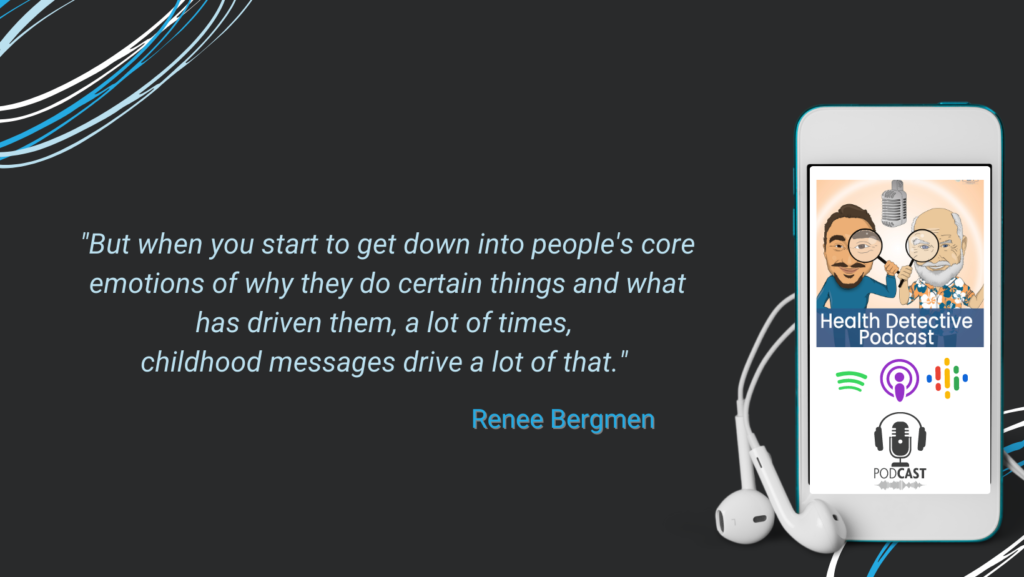
But when you start to get down into people’s core emotions of why they do certain things and what has driven them, a lot of times, childhood messages drive a lot of that. So, for 8s, 8s feel like it’s not okay to trust or be vulnerable with anyone. There’s this fear. There was probably pieces of your childhood that felt…whether or not they were real or just perceived.
We come to our number by perception of what has happened. Now there can be clear lines when people have clearly been abused or harmed or things like that. But I’m talking in a normal family structure where you just had normal family dynamics of things happening.
Mental Health: Perceived Family & Environment
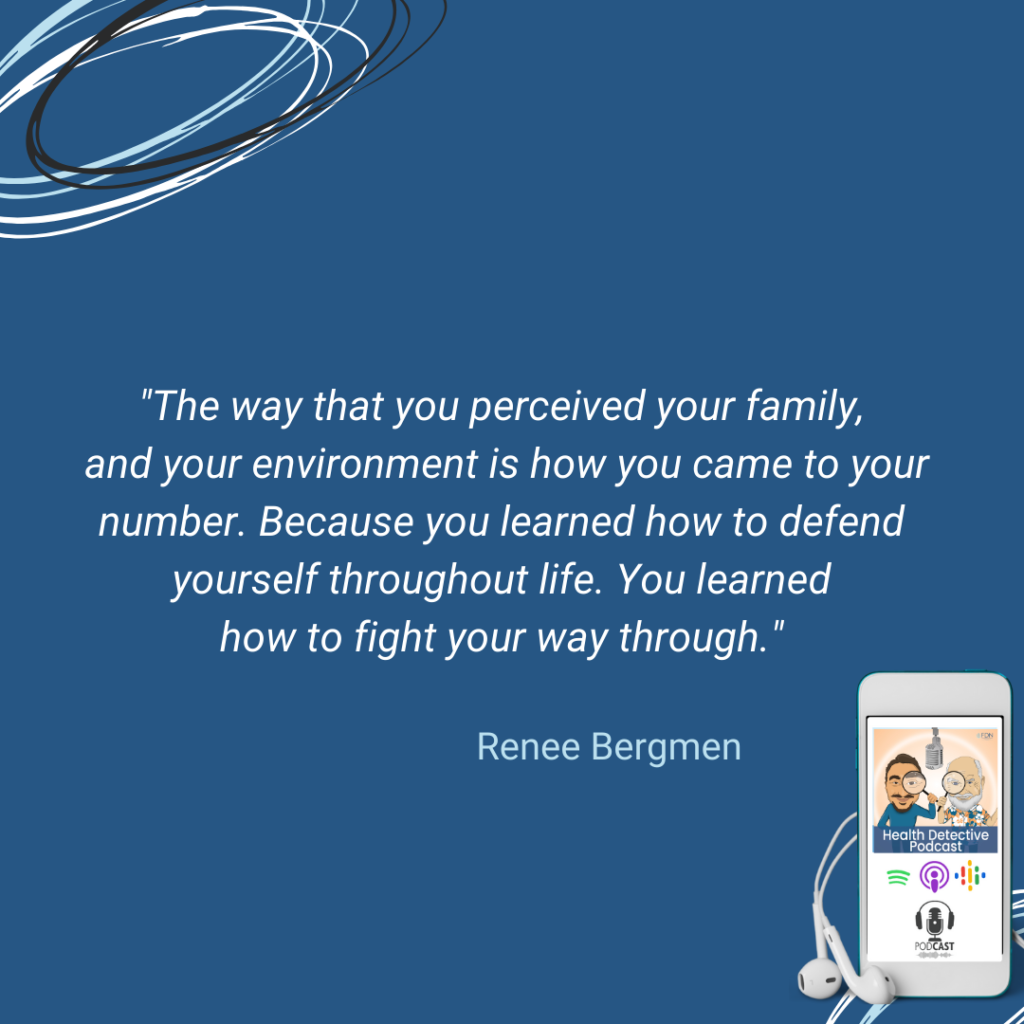
The way that you perceived your family, and your environment is how you came to your number. Because you learned how to defend yourself throughout life. You learned how to fight your way through. Whether it’s, you had lots of siblings, or you had parents that were always like asking you to defend why you were allowed to do certain things. Things like that.
But then there’s also this core fear of vulnerability, of like, what if I’m vulnerable with people and I don’t actually put up a fight, will they actually love me and just accept me for who I am? I’m sure that’s a lot of maybe even how she experiences you because she’s your closest person. You’re most vulnerable with her.
[00:14:01] Detective Ev: Yeah. This is just a wonderful way to describe it. I appreciate you saying the perception too. I mean, listen, my story’s no secret. I’ve mentioned it on the podcast before. Childhood was not perfect. But I think that was also the thing too, I realized that the Enneagram was more based in kind of a nurture theory.
I’m like, was it really that bad? The perception of things though was, no, it was terrible in a sense. There was that lack of trust and the disconnect. There were certain things that were hidden to actually protect me to be good. But I perceived this as, why am I being treated this way or whatever. And if I do express myself, people are going to take advantage of me.
The Enneagram Allows for All Different Types & Subtypes
That’s the other thing too, is Maddy has helped me actually realize, I would call them paranoid thoughts. It’s because, again, when it’s so natural to you, I think that’s why it was easier to resonate with the 3. Cause I’m like, Oh yeah. I’m self-conscious. I like being in a crowd, and I’m a speaker. I’m a podcast host too. Of course, I love this, so, sure it must be a 3. But this stuff is so natural that sometimes you miss it.
I automatically assume that every single person I’m interacting with is bad until proven otherwise. It’s not good until proven otherwise. They are out to get me. I cannot trust this person. People are bad. They are going to try to take advantage of me when they can. I mean, it’s just so innate to me that I don’t even think twice about it.
She’s realizing like, hey, just so you know, not everyone when they walk into a room is physically sizing up everyone to see who’s dominant. They’re not focused on these power structures that you’re obsessed with and nor do they not trust everyone. That’s not the rarest thing in the world, but it’s also not everyone else thinking that way.
I’m like, Oh, really?
[00:15:29] Renee Bergmen: Yeah. And you know, I love that you’ve learned a lot about that. It’s probably changed your guys’ dynamic as well. Has she figured out what number she is?
[00:15:37] Detective Ev: She believes, and we believe, that she’s a 9.
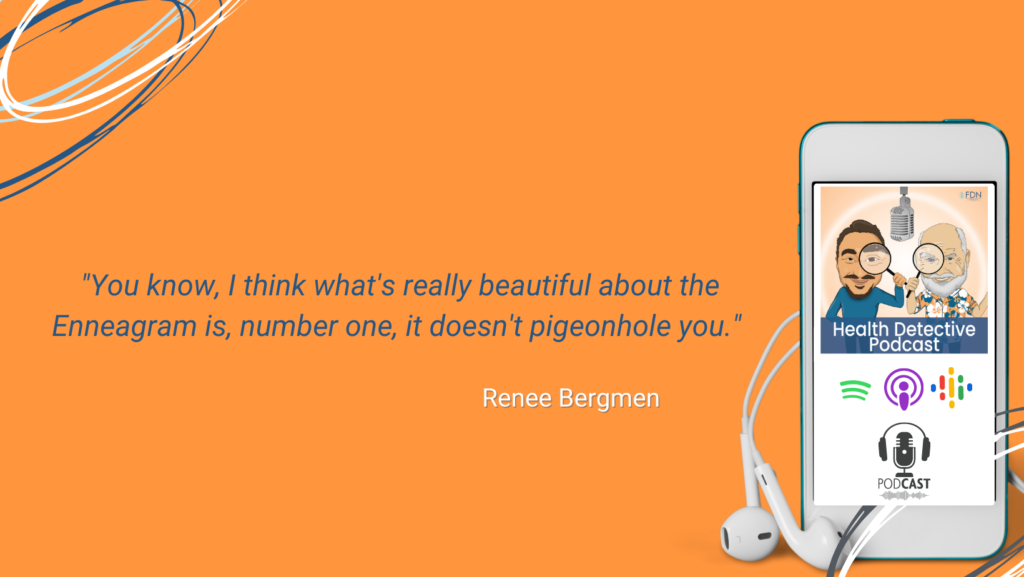
[00:15:40] Renee Bergmen: Okay. So, yeah. You know, I think what’s really beautiful about the Enneagram is, number one, it doesn’t pigeonhole you.
Mental Health: What Area of Life Am I Deficient In?
There’s lots of fluidity within every number. There’s different subtypes of every number. The point of it is to help you understand who am I, and how do I navigate within the world so that I can have a better lens to actually integrate into relationships and to be able to move fluidly.
Also recognize that not everybody else manages life the way that I do. I think that was one of the biggest light bulb moments for me, even with my husband being like, wait, you don’t think about it like this? How is that possible? Right? Like, that’s what your mind and your world are every day and all day long.
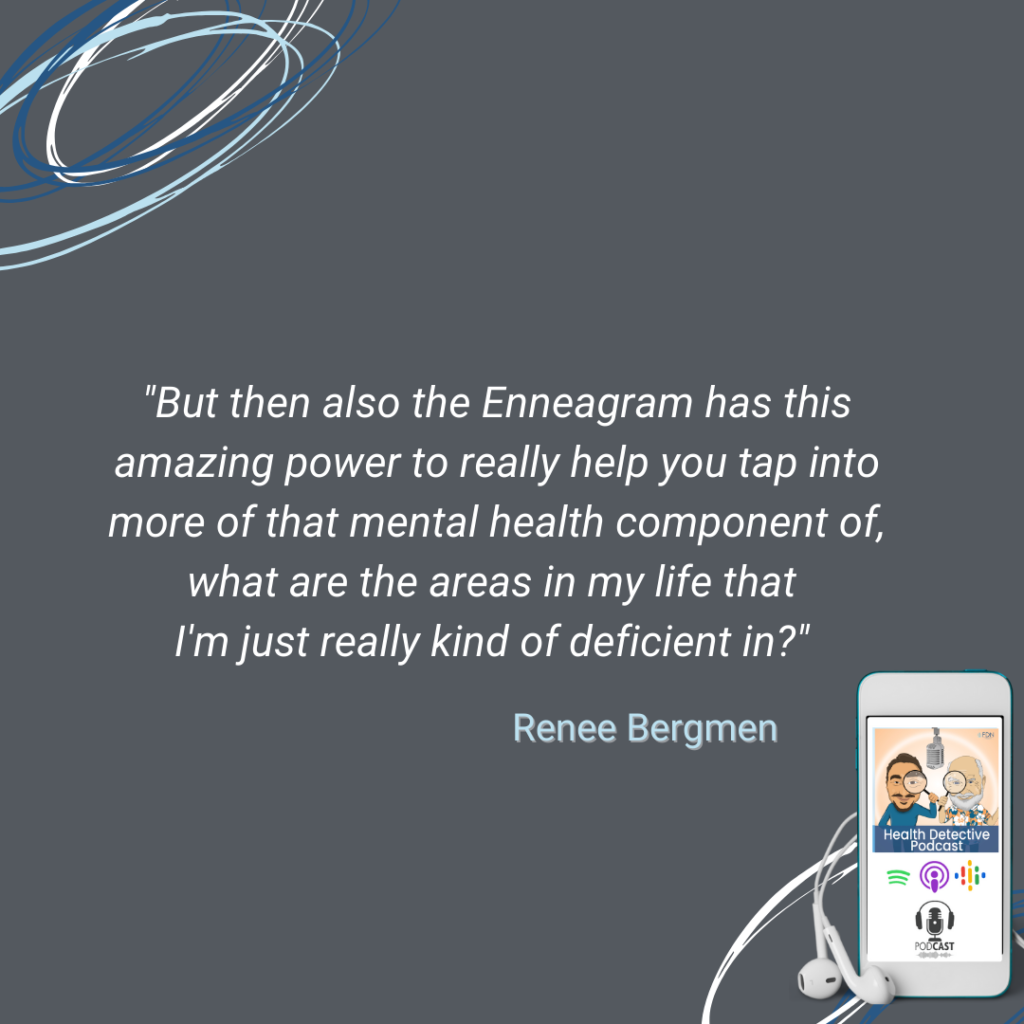
But then also the Enneagram has this amazing power to really help you tap into more of that mental health component of, what are the areas in my life that I’m just really kind of deficient in? If you’re always feeling like you need to fight, what were some of those wounding messages that were communicated to you and how do you use that to really change your physical health?
As FDNs, we’re always thinking about what are the things that are coming at people that are stressors, that are changing their physical health? I think you talk about this all the time. You’re really articulate in your story and your experience of mental health and how much changing your physical health changed your mental health and how those have to be synonymous.
Is the Enneagram Relevant to Mental Health?
I love that sometimes people feel like they need to go immediately to a counselor and figure out all this childhood trauma. Maybe that’s true, right? Like, I experience that a lot with clients. I’m sure you do too. But maybe they just need to figure out what perceptions in their world made them who they are today, and how do they navigate through that to kind of get to this better understanding so that their mental health can flourish.
[00:17:33] Detective Ev: Well, that brings us to the topic of the day. Now that I’ve just wasted 13 minutes of the audience’s time. I’m kidding. It’s weird though cause normally, I feel like I’m good at, let the guests do their thing. But man, you get me on personality theory, it’s gone. So, I hope they listen regularly because then they’ll know I’m telling the truth.
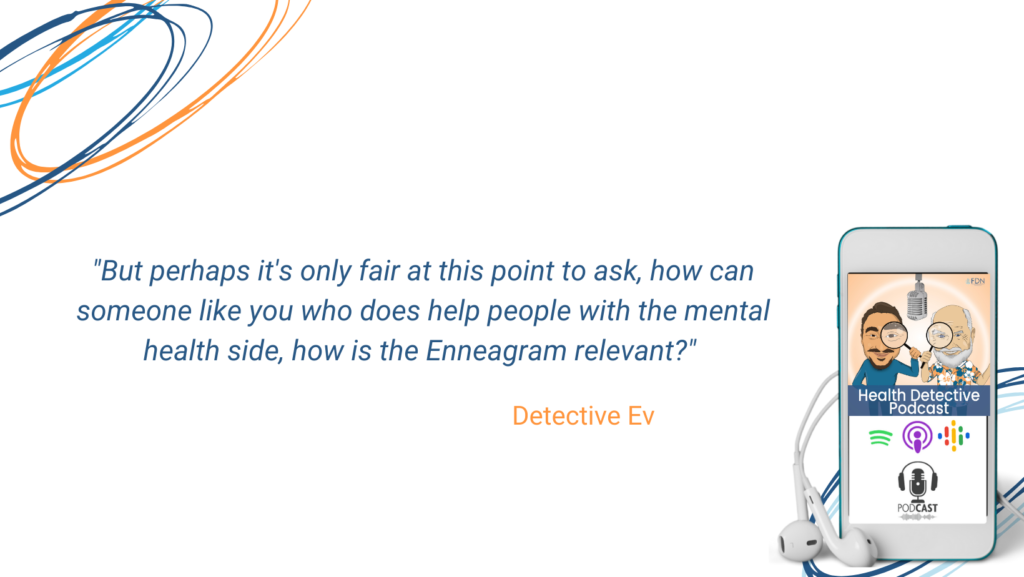
But with this said though, there actually is a relevance to this, cause we’re talking about mental health today. This is something that you happen to specialize in, and I know that there’s more components with how you approach mental health. But perhaps it’s only fair at this point to ask, how can someone like you who does help people with the mental health side, how is the Enneagram relevant?
We don’t necessarily have to explain the whole thing, cause again, they could listen to the first episode for that. But I’m curious.
Mental Health: Mind Stress
[00:18:11] Renee Bergmen: I think when you first dive in, when FDNs first dive in, we always want data, right? We’re always looking for the data. That’s a big part of being in FDN is running labs, seeing all these labs, seeing the dysfunction of the gut through the GI MAP, and seeing the DUTCH test, seeing all of that information.
What you can’t do with a lab is look at what are the components of someone’s thoughts and the way that they navigate throughout the world that is placing impact on their body, right? Like I can’t give someone a lab that looks at their blood or looks at their gut or looks at any of those things to tell me they feel like they’re small moving throughout the world, and that they have always had to try and swing to fight in every situation.
Or that they feel like if they speak up, they are being too much of a bother to people. Or if they choose to be serious instead of fun, that people won’t actually want to engage with them, right? Those are things that you can’t get from looking at a lab, but that’s such an intricate part of who we are. That’s so much of where our stress comes from.

When we talk about stress being such a huge component of D.R.E.S.S. we have to figure out how do we really help clients get to the nitty gritty of where that stress comes from. There’s the physical stressors of gut infections, hormone imbalances, and job stress. But what about their mind stress?
Mental Health: Understanding How Who You Are Affects Your Body
What about their functionality with how they interpret their spouse talking to them? Or going to their kid’s school and how people receive them. That’s such an invaluable piece of people’s puzzle. I think the Enneagram is such a great tool.
You know, I’m not a licensed counselor, so it’s not my job. There’s a space and a place for people to go and seek out counseling and really deep dive into maybe childhood trauma. But when they’re working with people like us, like FDNs, oftentimes they still have to talk about some of those pieces in order for the puzzle to all come together and see full flourishing.
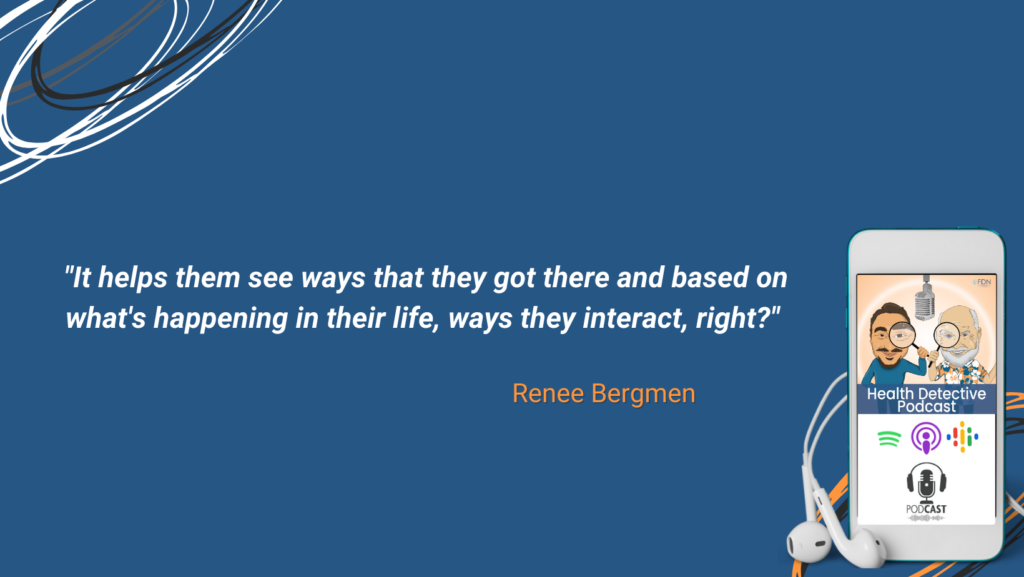
The Ingram is this really accessible tool. It breaks it down in bitesize pieces for people. It helps people understand, oh, there are more people that function like I do. It helps them see ways that they got there and based on what’s happening in their life, ways they interact, right?
In times of non-stress, they go to a different number than their primary number. I’m a 7, I go to a 5 when I’m healthy. But when I’m stressed, I go to a 1. So as a 7, I’m really low key and chill and I always bring the fun to a party. But put me in a stressful situation and all of a sudden, I am black and white as all get out.
My family, all of a sudden, will be like, what happened? Why is mom freaking out right now? Because I’m being very methodical about, I need you to do it this way. There’s only one right way to do it and I need to control the situation cause that’s what I do in stress. Well, that’s super important for me to know.
Mental Health: The Enneagram Enables Understanding of Others
That informs me so much in what’s going to happen in my body if I’m doing that constantly. What do we know about that? I’m just in fight or flight all the time, right? There’s these direct lines to helping people see when we start explaining vagal nerve work and the importance of really calming down before you eat, all of these tips that we give people.
Sometimes they don’t understand where they’re at in their day. The Enneagram provides these really cool resources for them to have a better picture of how they navigate throughout the world. And that there’s other people that navigate that way too.
[00:21:58] Detective Ev: I think that’s so cool that you’re able to utilize this with clients.
I mean, anyone that’s listening or watching can see how excited I am about it. It could be a good thing to at least, whether it’s with Renee or someone else or just online, like figure this out for yourself. It could be any personality typing system. Cause again, I like Myers Briggs.
Clearly the most scientifically validated as of right now is the Big Five, we know this. But here’s the thing, people know I’m a science-based person. So, they’re like, how are you so attracted to and obsessed with these things that in a certain sense are kind of pseudoscientific? It’s not really about that.

They’re close, you know, they do work. They definitely work to categorize. I’ve seen poster children of each individual type at certain times. What I have found it does for me the most is (I think this does relate to health and mental health because relationships matter), it strengthens my ability to understand other people.
Mental Health: Staying Open to Others
Now there are certain things that I would assume all of us just can’t get behind. If you’re just blatantly hateful, whether that’s something ridiculous, racism, whatever it might be. No, I don’t need to know your type. That’s something I’m going to adamantly disagree with.
But if it’s a political difference, if it’s a difference in lifestyle, if it’s a difference in morality around like sex. Maybe you’re someone, assuming this is all consenting adults, maybe you’re someone that believes it’s no problem to have 50 partners. Maybe you’re someone that believes you should only have sex when you’re married and try to stay together no matter what. Those are wildly different views on life. And I have been able to accept those people even when I disagree with them because I start to understand them.
That’s why, in Myers Briggs, David Keirsey’s book is, Please Understand Me I and II. It’s all about understanding these people. So, where I might have been able, like as when I was younger for sure, it’s not only do I disagree with you, it’s now, I don’t like you because I disagree with you, which is, holy crap, a theme of today’s world and the political climate and religious climate and everything else.
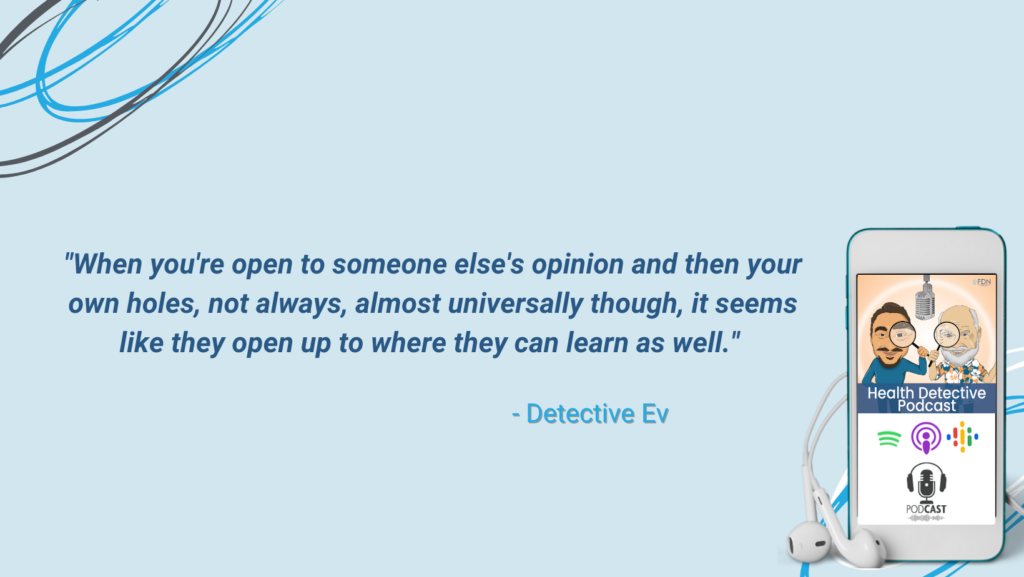
Now it’s, oh, I disagree with you, how fascinating. Let’s see why you came to that conclusion. I’m really interested in that. And I’m open to where my holes might be. When you’re open to someone else’s opinion and then your own holes, not always, almost universally though, it seems like they open up to where they can learn as well. You end up creating this beautiful thing.
Mental Health: We Live in a Confusing World
I know you and I are connected on social. I’m sure we don’t agree on perfectly everything and I feel like you’re very supportive of my stuff. I think that’s amazing. That’s how it should be. That’s cool. And it’s no surprise that you’re someone that studies personality theory. Because if it’s something you disagree with, you probably say, Okay, well this is why Ev might think this way or does this, but he’s still Evan and you know what? I had a great podcast with him, and I like him.
Just like I could say that about Renee even if there was something I disagreed with. I don’t understand why that’s such a concept, but I think this is what these things are very useful for.

[00:24:30] Renee Bergmen: Yeah, I think so too. You know, I think we live in such a confusing world of even how to know what we’re supposed to believe, what we’re supposed to lean into.
There can just be almost an excess of knowledge sometimes and an excess of information overload because of technology and all the things that we have access to, that sometimes I think people need some systems to sort of land themselves in, like this, like these different personality typings, just to kind of understand even how do I take in the world and how do I take in all the information that’s constantly being thrown at me. Because that impacts us so much.
Mental Health: The Enneagram Type 6
You know, on the Enneagram, a Type 6 is someone that can typically be a little bit fearful. They’re also the people that are ones that warn everyone of the good and the bad of all situations of what could happen. A lot of times people are pretty political when they’re 6s.
For a 6, when I’m coaching a 6 and someone is having all this gut dysfunction and they’re just constantly in distress in their stomach, I’m like, Listen. You gotta stop watching the news. You gotta pull back because you’re just in information overload of all these options and fearful things that can happen. Your brain is just constantly going down those roads.
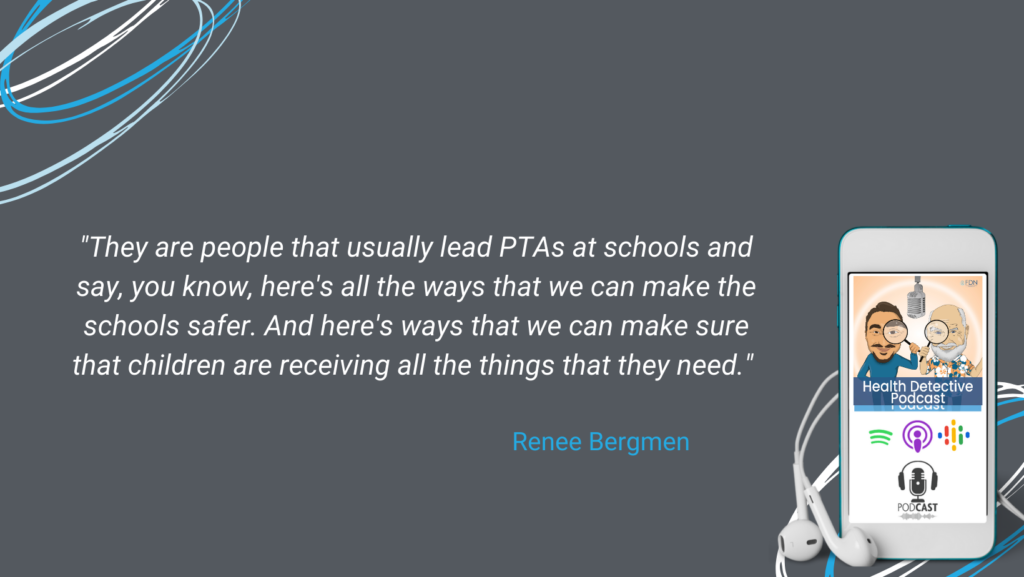
Now, as a 6 that does work and really starts to work on their own issues, they’re able to get healthier with that and to use it to their advantage in positive ways. They are people that usually lead PTAs at schools and say, you know, here’s all the ways that we can make the schools safer. And here’s ways that we can make sure that children are receiving all the things that they need.
Mental Health: Teaching Your Body
There’s a lot of benefit in really seeing the downfalls, you know. But when you’re going through a health journey, it’s super important to know the things that really just destroy you. So, for you as an 8, like in some of your most unhealthy moments, you just constantly arguing with people was probably very, very detrimental to your soul and to your gut and to your hormones.

Whereas as you’ve learned, like you were saying, like I’ve learned when I’m on this podcast, I need to have control and not be as combative because this is a time to just hear from other people. That’s teaching your body to calm down and have the correct pathway so that the body can operate the way that it’s supposed to metabolically, right?
Yeah. It’s just really fascinating.
Commercial Break: Biohacking Congress in Miami
[00:27:04] Detective Ev: Hey there folks, it is Detective Ev popping in here really quick. If you are in the Fort Lauderdale area of Florida, or the Miami area, and you are going to be around October 22nd and 23rd, which is a Saturday and Sunday, Reed Davis, the founder of FDN and myself will be down at a conference.
It is called the Biohacking Congress. There’s really up to date, latest and greatest tools. What’s interesting is this conference is actually kind of smaller because they do it a few times a year. It is a great opportunity to really get to meet these vendors. You can have actual conversations with us and the other people vending there, easily.
You could hit every vendor in one day. If you’re there for both days, that’s even better. There are tons of speakers. It’s going to be a good time. I really like big conferences. I don’t know who doesn’t. It’s fun to have that. It’s almost overwhelming though sometimes because you can’t get to everything. This conference is the opposite.
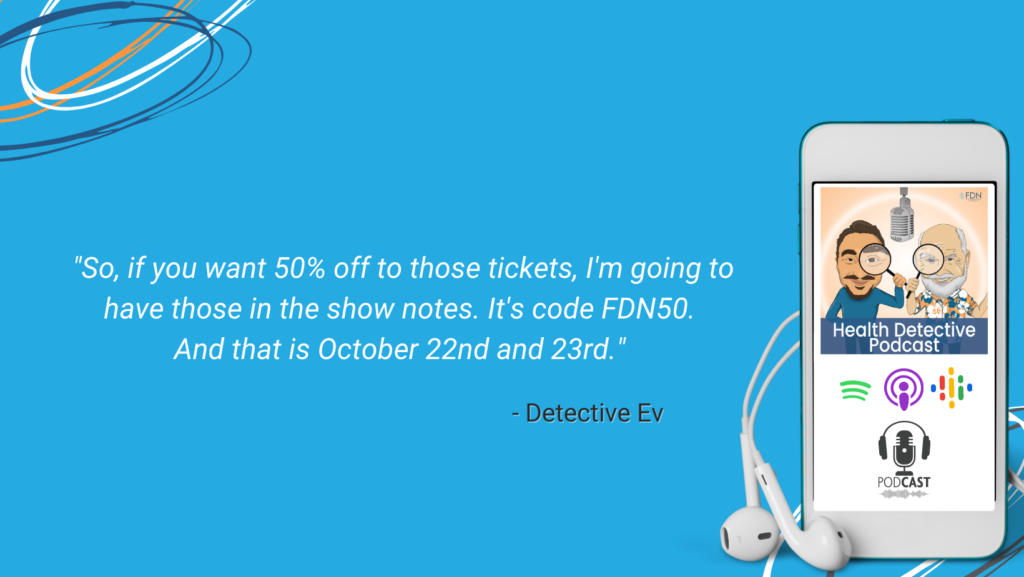
You could hit every speech; you could hit every vendor and it’s a really good time cause you’re in Florida. So, if you want 50% off to those tickets, I’m going to have those in the show notes. It’s code FDN50. And that is October 22nd and 23rd.
Commercial Break: Try the FDN Course for Free
In addition, if you are listening to this episode and maybe considering doing the FDN course or you’re trying to get into work like Renee and I do, I don’t know if you know this, but the FDN training program actually allows you to try the first part of their course completely for free. No credit card is required.
You go to fdntraining.com/tryfdn to try the course for free. That is fdntraining.com/tryfdn. I will have that in the show notes as well.
All right, now back to today’s episode.
Dealing with Mental Health Issues Requires Emotional Vulnerability
Right, and that was precisely where I was getting this confused. Because I thought, well, look at what I’m doing. I’m kind of changing myself to be this person on here. And it’s like, well, no, I’m doing that because especially out of context. I mean, I fully admit this. I’m like one of those people that you could destroy their entire career by taking something out of context cause naturally, I’m just aggressive and I’m blunt.
Anyone that knows me knows, I’m like the first person that would be there for you at 3:00 AM if your car breaks down. But the way I display things, unfiltered, I can recognize now, oh, okay. I see why other people are turned off by this, even if that’s not how I meant it. It’s just loud, it’s in your face. It’s this, and it’s opinionated on top of it.
So again, it would be like one of those people that you could take the clip from. I mean, I guess you could do this with a lot of people nowadays. But I would be especially prone to being that person that someone could take a clip of and be like, look at what he said. It’s like, well, that’s not actually what he meant at all. And he’s, you know, getting on one of his little “Ev rants”.

But I’ve learned that, if I’m going to do the podcast or, oh my goodness, the mental health speaking to kids, that was one of the toughest ones, right? That first of all, requires emotional vulnerability. I was going in unintentionally, almost lecturing on facts about mental health at first.
Mental Health: Being Aligned with Who You Really Are
One person commented (I’m connecting all these dots now, looking back), she said, she saw my presentation one year and then about a year later I came back again. She said, I just want to be honest. I don’t mean it rudely. This was a lot better the second year.
And I said, I don’t take it rudely. I want to improve, so tell me the why cause I don’t realize what I’m doing. She’s like, well, last time you gave a lot of interesting facts. This time you spoke about the things that you felt. And I’m like, Oh, as a Type 8. You know, I’m kidding. But you know, obviously that’s how you have to do it, especially speaking to kids.
It’s like they don’t, not all of them, care about facts about mental health. They want to know what you’ve experienced too. So that job has been the biggest aspect of the personal development, at least, if I’m assuming that I’m this Type in the context of the Enneagram, that’s been one of my biggest ways to personally develop. Because to be successful at it requires me to do the thing that supposedly my Type fears the most, which is emotional vulnerability.
Oh, by the way, we’re going to talk about the worst parts and most embarrassing parts of my life that ever happened. You know, it still challenges me.
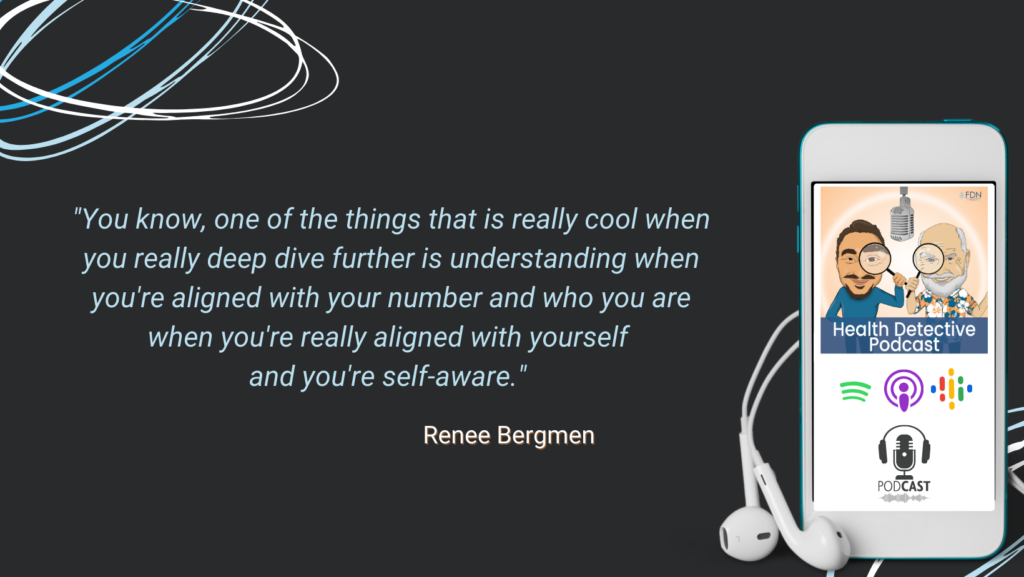
[00:30:50] Renee Bergmen: Yeah. You know, one of the things that is really cool when you really deep dive further is understanding when you’re aligned with your number and who you are when you’re really aligned with yourself and you’re self-aware.
Mental Health: Type 8s Intensity to Plow a Path for Others
One of the things about the 8 when they’re aligned is that you use your intensity and power to plow a path for others that can’t plow a path for themselves.
That is exactly what you have been called to and that’s what you’ve been doing. You have seen your mission as, how do I get out into these schools and help these kids that are having all these mental health issues?

There’s lots of facts for them to understand, like, you know, that’s kind of where you wanted to start. But as soon as you started to bring that vulnerability piece, that one was exactly spot on. You started to use your intensity to plow a path for them to figure out, how do I really realize my vulnerable self and reach out and get help.
[00:31:49] Detective Ev: Absolutely. Very cool. I think that was another thing that Maddy saw. I mean, I recognize it myself. I read those parts where it’s like, well, they’ll stick up for the underdog or use their strength to stick up for those who can’t do it for themselves.
Even in the last year, especially as I become more educated on it, I’m not saying it’s a high number. I’m not able to do that at this time, but it’s just the effort of donating to this nonprofit that does child sex trafficking. I was talking about it so much that Maddy, cause we didn’t know each other that well at the time, she was like, do you have something to tell me?
She thought I was involved in that because of the passion. I’m like, no, but I can see it. And I’m like, how can you do that to a six-year-old?
Mental Health: Type 8s Using Their Alignment for Good
It’s almost like I feel this pull. It’s like, I know you can’t defend yourself so I’m their worst enemy. Cause I’ll come mess them up and will even do that, in some way or another, because that’s unacceptable, the fact that that’s going on in this world. I’m sure you could do this with a million different issues.
But when I read that, I’m like, oh, I don’t do that. I’m like, wait a second. Yes, I do. Like, it energizes me. It’s actually a cool way to use that power in a kind of aggressive way that people can get on board with. They’re like, yes, go be aggressive against that. That’s good. Don’t do it against me, do it against that.
[00:32:54] Renee Bergmen: It takes organizations and all these different types of companies that are in the world that are nonprofits or for profit, there has to be different personality types and different ways that people function, and we’ve experienced it.
Have you ever experienced, when you’re working with someone, they totally are a round peg and their job is a square hole? You’re trying to fit them in and it’s just like a total disaster, right?
For you, when you figure those things out, you’re learning, I know how to do this just effortlessly. I mean, not totally effortlessly. I understand that you’ve had to really grow in who you are and learn a lot about yourself.
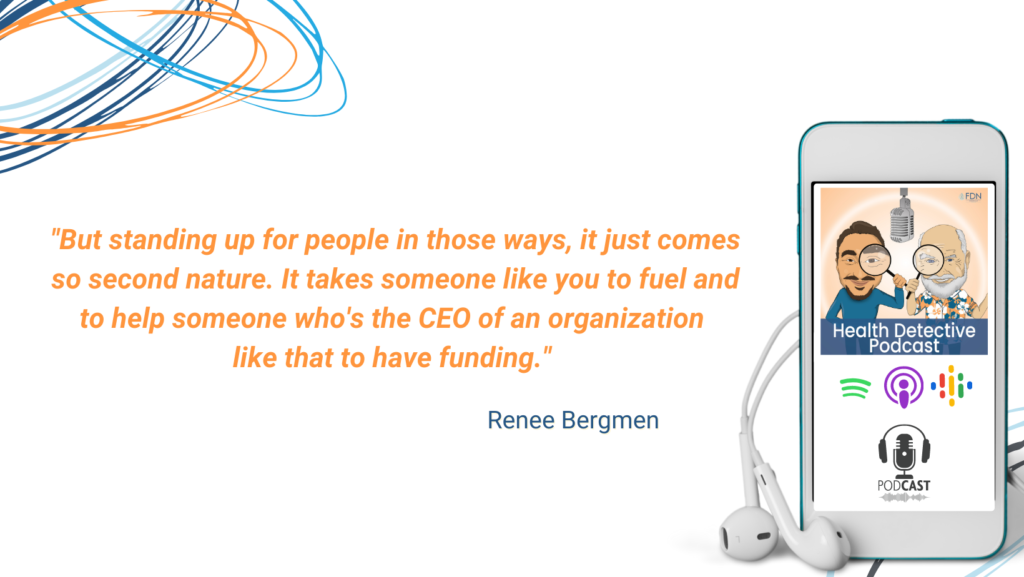
But standing up for people in those ways, it just comes so second nature. It takes someone like you to fuel and to help someone who’s the CEO of an organization like that to have funding. They’ve gotta have people that go, no, this is a justice issue that has to be pursued.
Mental Health: Being Who You’re Designed to Be
When you are in alignment in that way, your body functions at a higher level and you have more capacity. That’s the thing that I just am always like blown away by.
When people think that the way that they eat doesn’t impact what they do all throughout the rest of their day. It’s not just like, do you feel like you’re fat or not have energy? Sure, you don’t necessarily want those things, but like are you able to actually go and do the things that you’re super passionate about?
The reason we do what we do as FDNs is to get people to that place, right? It is to get them to a space where they go, I get to just be who I was designed to be and to seek after that with my whole heart and my whole being. So, they don’t also feel like crap while I’m doing it or just not do it.

A lot of people just don’t end up doing the thing that they’re really passionate about if they don’t feel good.
[00:34:44] Detective Ev: That’s so true. It is remarkable that before we got on air, I was like, well listen, if we don’t make it to the 50-minute mark, cause it’s the second episode, no big deal. Here we are at 30 and I’m like, all right, I’m thinking about part three.
No, but seriously, I know we obviously have integrated this with the mental health side today, but there’s other aspects. I would imagine that just about anyone that listens to a podcast like this appreciates what we’ve been saying. But I also want to relate it to some other things too.
Mental Health: Can’t Take Out the Mind-Mental Piece
I know your husband’s been working on stuff and we wanted to talk about that. Especially as the second episode, I’d love for you to take this wherever you want to right now. We’re talking about mental health. What are some other things that you would like to mention today? It could be just about anything that we do as FDNs.
[00:35:21] Renee Bergmen: My husband just recently launched his own company called Metastory Health. He is getting a master’s in counseling. He really is my primary employee for my business, for Megaphone Functional Health.
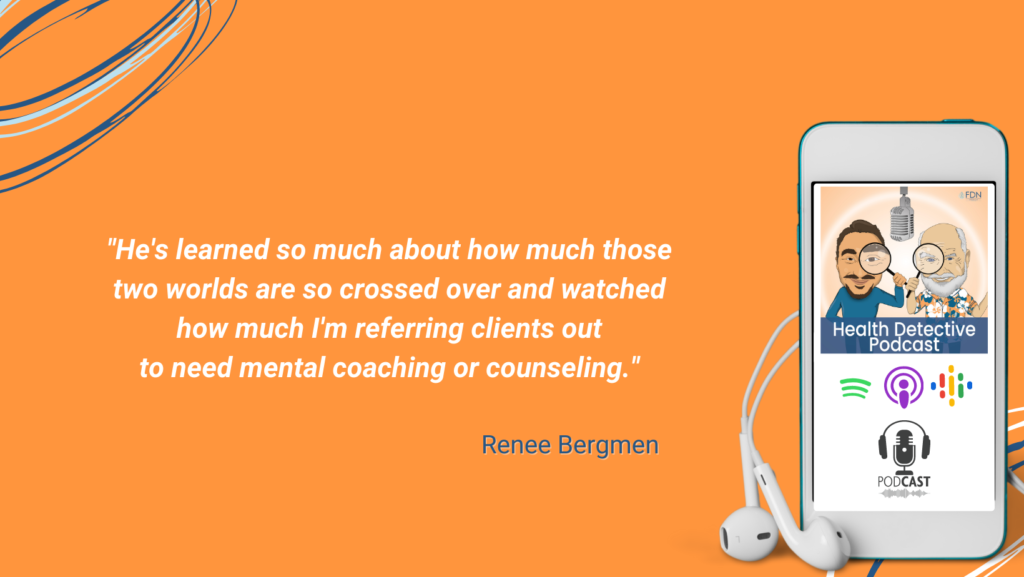
As he has watched and grown so much, and I have just told him, no, you can’t do that, that’s bad for your gut. Don’t do this, don’t do that. All the things that happen in a marriage when you do what you do as an FDN. He’s learned so much about how much those two worlds are so crossed over and watched how much I’m referring clients out to need mental coaching or counseling.
So, we’ve begun to really look at, how do these two worlds really converge together and not ignore one another?
One of the things we love about functional medicine and the functional approach is we are not zeroed in to one thing. We don’t diagnose. We don’t say that we’re like a specialist in this one, necessarily focused area of the body. We look at the body as a whole.
If we’re really looking at the body as a whole, we can’t take this mind-mental piece out. So as FDNs I’m really passionate to keep pushing on all of us to find referrals. You have great counselors, find someone that you partner with that you’re working with.
Integrating Mental Health Profession with Functional Approaches
That’s a big part of what we’re starting to do is like, what are some programs that we can create for people where they’re doing both worlds? They’re truly pursuing their mental health and getting to some of the deep, dark pieces that need to be dealt with alongside dealing with all the functional diagnostic pieces that we as FDNs do.

How do we combine D.R.E.S.S. with a mental health approach that really helps people to have full flourishing and not feel like they’re being parsed out? That’s a big part of what clients say when they come to us as FDNs. It’s like, I’ve seen this doctor and this doctor, and this doctor didn’t talk to this doctor. My health has just felt confusing. We don’t want that, right? We want people to feel like they have a whole system.
I’m really hoping that the mental health profession continues to see how important it is to integrate in functional approaches for people’s gut health and hormone health, to truly see that change that they’re seeking when they’re dealing with people that have major trauma and needing to deal with past hurts, stuck hurts, or are dealing with major weight issues that they can’t get rid of because of some of the narratives that are going on in their minds. There’s so much that the mind is responsible for. We cannot divorce it from the rest of the body.
I’m really excited about that. I am seeing it more and more. We’re starting to see more and more practices coming out with this saying they have different types of practitioners that you can see and integrate. These practitioners talk about your particular situation in case to really bring you the most flourishing and the most healing.
Recognizing Every Level of Mental Health
[00:38:32] Detective Ev: That’s going to be a heck of a tag team. I love that you guys are doing that. I do believe, especially right now, there is more acceptance than probably ever to this idea of the functional side. It kind of goes both ways. Just like you were saying, a lot of the clients you see coming to you from a functional perspective need the counseling side, the traditional mental health side.
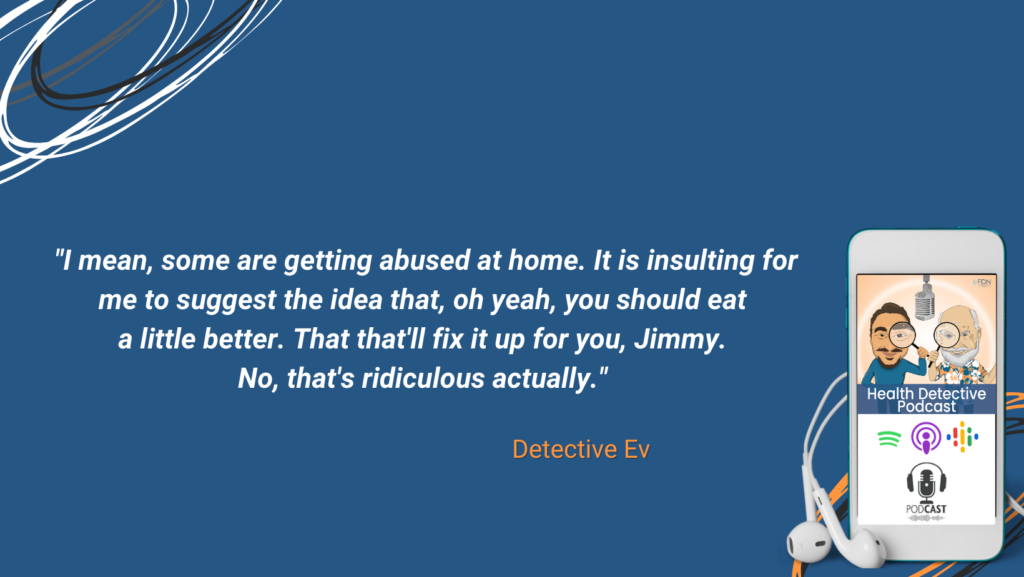
But similarly, when I’m going into schools, I know there are so many kids out there, not all of them relate to me. I mean, some are getting abused at home. It is insulting for me to suggest the idea that, oh yeah, you should eat a little better. That that’ll fix it up for you, Jimmy. No, that’s ridiculous actually.
But at the same time, Renee, I mean, you and I both know well, there are millions of kids out there right now and adults like myself, who, okay, life’s not perfect. I get that. But it is so clear that my mental health stuff and that other physical health stuff came long before any of the traumas of my life. I would go as far as to say the majority of my trauma came from unresolved mental health issues, not the opposite way around. I think there’s more receptivity to this than ever before.
With that, I don’t know if you saw this, you probably did, that whole thing that came out with the SSRIs, which amazingly seemed to just get swept under the rug by the media pretty quickly.
Mental Health and Physical Health Intertwine
It’s like, oh, by the way, yeah, those aren’t nearly as effective as we once thought, and they weren’t really that great to begin with. In case it’s someone’s first time listening, I apologize to sound like a broken record for regular listeners. I’m not against medication at all, in fact, I think there’s people that greatly benefit from it.
I think I actually piss all functional health practitioners sometimes when they hear me one on one, how accepting I am of medication. Cause they’re like, well, do you really think a kid should be doing that? I’m like, maybe not. But I know the worst option is a kid that’s not talking about this at all.
So, I don’t know what their particular treatment plan is, but I know the most dangerous thing is a kid that suffers in silence and is not getting any help of any sort. I’m nearly positive of that. I’m with you on that.
But we saw this come out and it’s like, okay, our first line defense, which really has been these meds for the last few decades, oh, you know, it might not really be as good as we thought.

So as more people become aware that that came out, I think they’re going to seek out these alternative means. I think the toughest part, and you correct me if I’m wrong here, or contribute to this in any way, I think the toughest part is people want to believe it. I say this and it sounds good, but it’s very hard for people to conceptualize the idea that the panic attacks that they experience, or the bipolar episodes can have something to do with their physical health.
Mental Health: Stories Are Crucial
It can be so calculated with labs, and it can become precise with labs, like the treatment options, that they actually have an opportunity to resolve these symptoms. I just say that as someone who’s done it and seen it in others, it’s very hard to get them to conceptualize that.
You find that probably to be the case in your world?
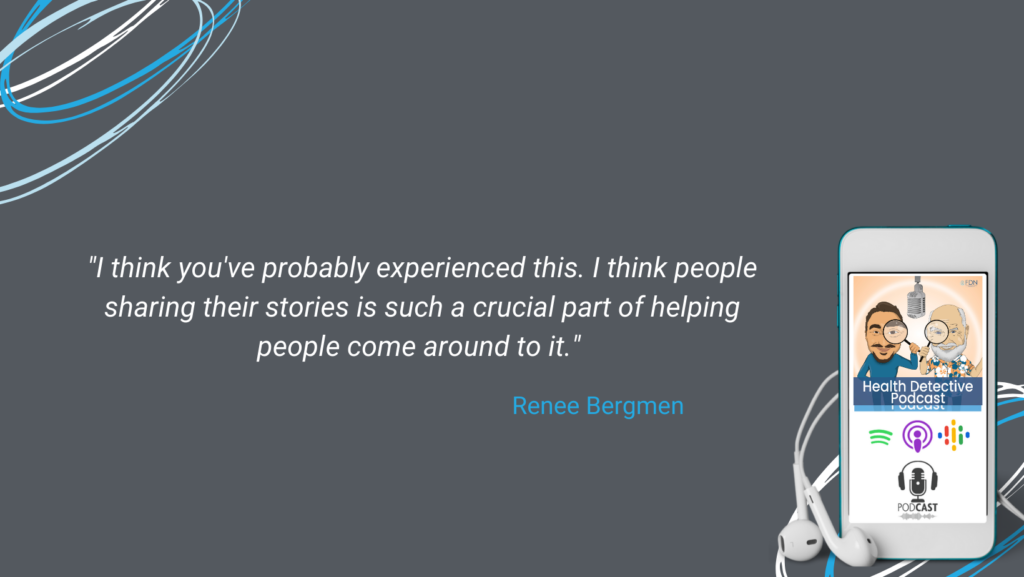
[00:41:10] Renee Bergmen: I do, I think this is where story is so important. I think you’ve probably experienced this. I think people sharing their stories is such a crucial part of helping people come around to it.
I share my personal story of being on antidepressants for years, and then I had to be pulled off in a moment of time because I thought I had Stevens-Johnson syndrome, which is where all your skin peels off and you like burn from the inside out. It’s awful. It can happen.
People can be on a medication for a long time and all of a sudden, your body becomes like allergic to it. But the only way to know if it’s going to fix it is to pull you from whatever medication you’re on. I was petrified. I had been on an antidepressant that was actually for bipolar, so I had been diagnosed bipolar.
Now going back and looking at who diagnosed me with bipolar, I never should have had a bipolar diagnosis. It just was not accurate. I’m not saying that bipolar isn’t real, it absolutely is. But I was not bipolar. So, I was being given the drug that was for even a mental disorder I didn’t have. Then, to be pulled from it and have to figure out what I was going to do.
Mental Health: Stories Help People Change Their Minds
I had struggled with suicidal ideation, such depression, I could barely get out of bed. I mean, I had the deepest, darkest depression you can possibly have. It really is only by the grace of God that I didn’t choose to take my life. And I had lots to live for. I had a wonderful marriage, children, there were beautiful things. But I also had massive things going on internally for me.
I share this with people, especially those that are really afraid to go off medication, of me even saying, I say the same thing that you do. I’m not telling you have to go off your medicine. That would be so dumb of me to just say, you know what? You don’t need that medicine. Because there was a time in my life, I did need the medicine.
I didn’t know any other steps. I didn’t know the other things that I could do that could change what was happening physiologically in me. So, for me, story is such an important piece of the puzzle. And as I have clients that begin to have freedom and maybe step off of a medication or drop down on a medication to share their story, to listen to podcasts like this where people talk about story, it’s just so impactful.

People start to see this is someone that’s not just saying, I know this stuff in theory, right? Like and I’ve learned all this in my training. This was real life experience. This was your real-life experience. That is what changes people’s minds. That’s why it’s so important to be able to be willing to be vulnerable about what you’ve walked through. And be really honest, especially in the mental health field.
The Fear to Open Up About Personal Mental Health Issues
[00:43:56] Detective Ev: You took the words out of my mouth.
[00:43:57] Renee Bergmen: People are really willing to talk about like, I was diagnosed with cancer, and I had an autoimmune disease. Those are really vulnerable things as well. But there’s something about the mental health piece, right?
People are really scared to say, I wanted to kill myself. People are really scared to say, I thought that I had absolutely no worth, and I wanted to do nothing all day long. I could have sat in my bed and ate Taco Bell for every meal and watched TV and never moved. That’s a really, really hard, scary thing to talk about because it feels like you’re lazy and like if you would just get out of bed, you’d probably be okay.
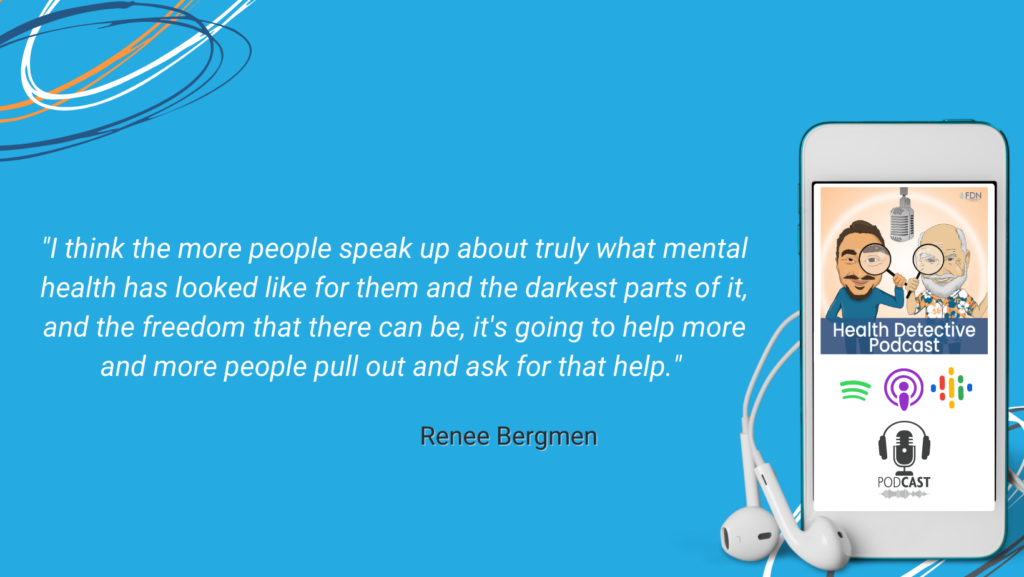
It’s all these things that, you know, narratives, maybe people have said them to you. But maybe it’s just narratives we’ve told ourselves, you know? I think the more people speak up about truly what mental health has looked like for them and the darkest parts of it, and the freedom that there can be, it’s going to help more and more people pull out and ask for that help.
[00:44:55] Detective Ev: That was so crazy. I was literally thinking that exact thing. When you have, again, an autoimmune disease, and I’m someone who’s dealt with that myself and my family has, if you found a doctor like an alternative doctor on YouTube that was talking about it, I don’t think I would, nor can I ever imagine someone being like, well, they’ve never dealt with this autoimmune disease. Like, why can they help me? It’s like if they just make logical sense, you kind of follow it.
There’s No Way to Measure Mental Health Issues
Versus if someone starts talking about, again, bipolar, depression, whatever, and they haven’t dealt with it, I think there is a larger audience to that, that would say, well, I don’t care if they’re a doctor (maybe not so consciously), but like, I don’t care that they’re a doctor. You don’t know my story. You don’t know what I’ve been through.
I think there’s a couple aspects there because it’s the unique nature of everyone’s mental health issues. Like psoriasis. I’m sure people experience it uniquely, but generally speaking, psoriasis is psoriasis. It kind of looks the same. We can objectify it and say, oh, that’s what that is.
Versus depression for someone might look like extreme substance abuse. For others, it might look like sitting in bed all day and not being able to get out and eating Taco Bell all the time. For others, it might be extreme suicidal ideations. For others it might be not sleeping at all and possibly even sleeping for 12 hours a day. It’s hard to measure.

Well, there’s technically nothing to measure in a sense. Right? You’re not getting a lab test for this per se. I mean, functional labs could obviously correlate with it, but it’s not diagnostic in the sense that like, something for autoimmune would be. You either have antibodies to your thyroid or you do not have elevated antibodies to your thyroid, period.
So, I think it’s those nuances there that lead to that idea. I mean, there’s a saying, facts tell, story sell. I think it is extraordinarily true here that the stories are really selling and it’s not selling our coaching. I’m saying, selling the idea that, maybe this person can help me.
Mental Health: Medical Doctors are Still Necessary
I mean, I know FDN is a great qualification. The average Joe does not know that. I don’t have any degrees that are relevant to this, and no one asks me, where did you go to college to learn about this?
It is because I can just talk about it, and I have that story mixed in with the information. It’s almost scary that no one asks. But you know, at the same time, it’s remarkable that as a younger man, no one is questioning me and just say, Okay, cool. Can you help me? How do I work with you?
Again, bittersweet, you know, I don’t think people should have to go to someone that doesn’t even have a degree to get this fixed. I’d love it if it was a part of the medical system, but at the same time, it shows the power of these stories.
[00:47:09] Renee Bergmen: It does. Yeah. I also think that is an interesting piece of this world that we’re in. From someone that has experienced going to a lot of doctors and then not being able to give me any answers and feeling really left in the dark, I think people are starting to wake up to that.
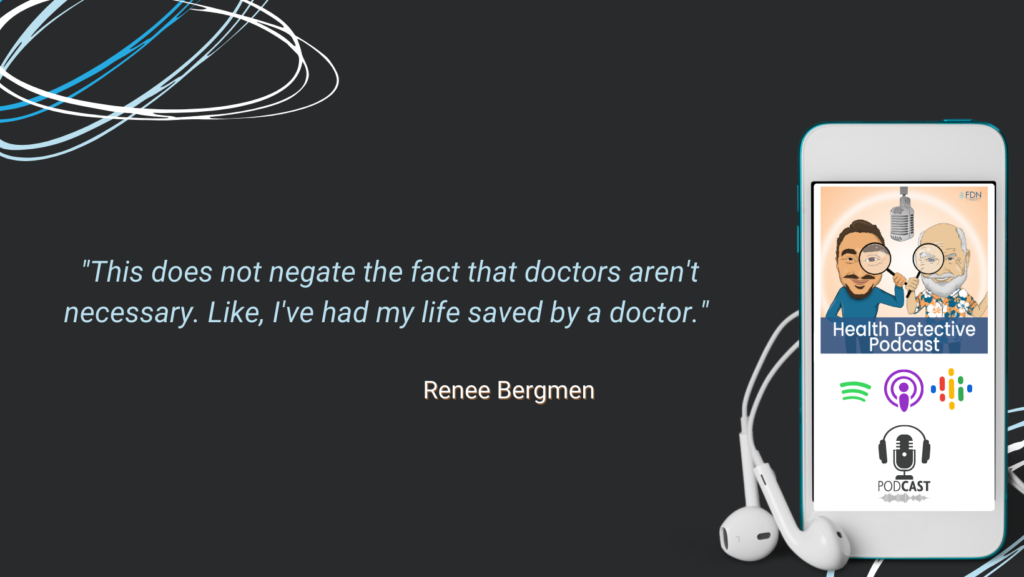
This does not negate the fact that doctors aren’t necessary. Like, I’ve had my life saved by a doctor. Without emergency surgery, I would’ve died two different times. So, I’m very grateful for the training that they chose to get.
Looking at Mental Health Through Holistic Lens
But it points to this idea that people think that doctors should solve everything. Right? And that’s just not the truth. That’s not what they were trained to do. They weren’t trained to solve everything that goes wrong in the body. They were trained on a very specific portion of the body that they have quite a bit of knowledge on that they can fix when it has 100% broken.
So as FDNs, I actually love it that more people are going, you know what? I don’t really care where you’ve come from. I want to see that you understand me, that you can navigate in the world that I’ve been in, that you’ve experienced some similar things, and that you yourself have experienced this transformation. Experiencing the transformation yourself is so impactful to lead someone else down that.
Now I think you need some level of training. That’s what FDN does. FDN is so powerful and such an amazing training system. But people aren’t asking, well, tell me what you learned during that process. Because they’ve experienced this so many times of people that can give them all these degree listings and where they went to school for them to not be able to do anything to make the patient sitting in front of them feel any better.
So, it is this. I’m excited to see the tide turn in all these areas. Even in mental health, that we’re no longer going, go see a psychiatrist because they’ll give you medication. Again, you and I have talked about this, like, not all medicine’s bad, but that’s not the answer.

The answer is, let’s figure out how to go deeper than that and wider than looking through a scope like this, you know, this little slither of life.
Mental Health: In-between Two Extremes
[00:49:25] Detective Ev: I would think everyone can agree with this universally. I mean, I know no one’s deficient in Zoloft. So, at the very least we could start there and say, Okay, just cause I’m not deficient in something doesn’t mean it’s not helping me.
But at the same time, if it is true that I can’t be deficient in it, then perhaps there is something else here. You know, there’s extreme situations, outlier situations that I can’t fairly speak on. I had a friend who passed away from a drug overdose and the abuse that was had in his household is so incomprehensible to me that, I don’t know, maybe that person would’ve been better off on a lifelong medication. I’m not sure. I’m open to it.
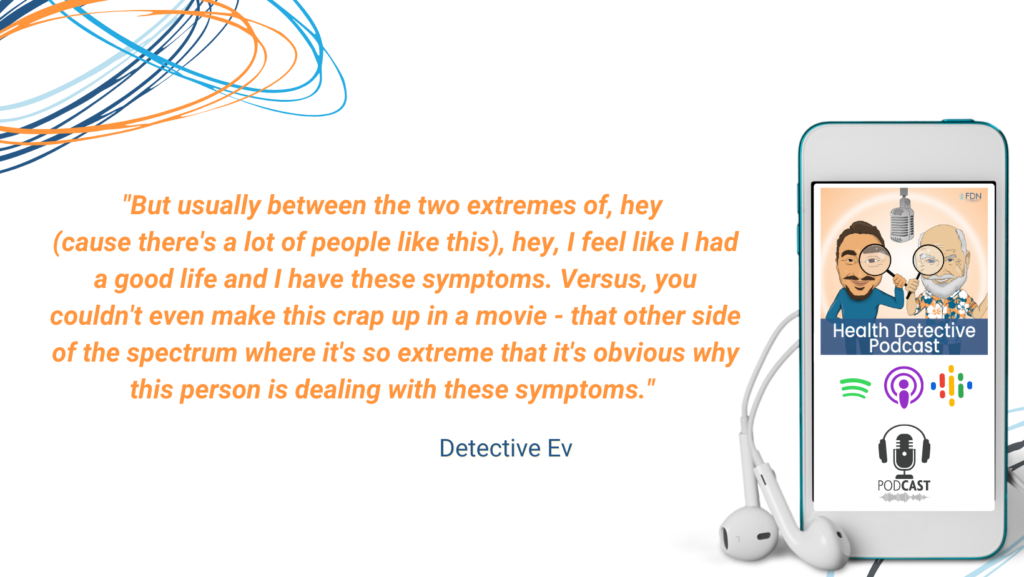
But usually between the two extremes of, hey (cause there’s a lot of people like this), hey, I feel like I had a good life and I have these symptoms. Versus, you couldn’t even make this crap up in a movie – that other side of the spectrum where it’s so extreme that it’s obvious why this person is dealing with these symptoms. Everyone usually falls in between here, most of those people.
It’s like, all right, medication for a time and then let’s dig deeper. That is where I would confidently call out the Western medicine system. Cause I’ve experienced this myself.
Mental Health: Prescribing Meds Wrongfully
I don’t even have a problem that you offered a 15-year-old, that I was at the time, Xanax. I was having daily panic attacks. It was affecting my life greatly. Fine. I don’t have a problem with the SSRI at 18. I was on house arrest because I was using substances and doing a lot of bad stuff. That probably would’ve been beneficial.

But the idea that there was nothing else offered, there was no other questions asked. I mean benzodiazepines are supposed to be short term. And that this was posed as an indefinite solution, that’s not only wrong, in my opinion, that’s wrong by their training. That was not how benzodiazepine is supposed to be used.
And it’s happening every day where people are on these for years because their primary physician, which, another ridiculous point to this, it’s their primary physician prescribing this stuff a lot. Never told them to get off. So that’s where I go against this.
[00:51:27] Renee Bergmen: My OB-GYN is who was prescribing it to me. When I look back on that, I’m like, you delivered my baby. That is what your role was supposed to be. When I came to you and said that I had postpartum and that I was not okay, that’s not their job.
That’s where there’s this real frustration that I feel. Then just no follow up whatsoever. Left the practice, moved out of state. I moved out of state and just like would continue to call and get prescriptions refilled. 10 years. 10 years, that I did that.
Mental Health: Meds Being Handed Out Like Candy
[00:52:03] Detective Ev: Wow. I remember when I used to tell these stories, like some people, especially on my Facebook, cause I talked about it kind of a little bit when I was younger. A lot of us were like 18, 19 as my friends. Some people didn’t believe this. Now I don’t get those comments as much anymore.
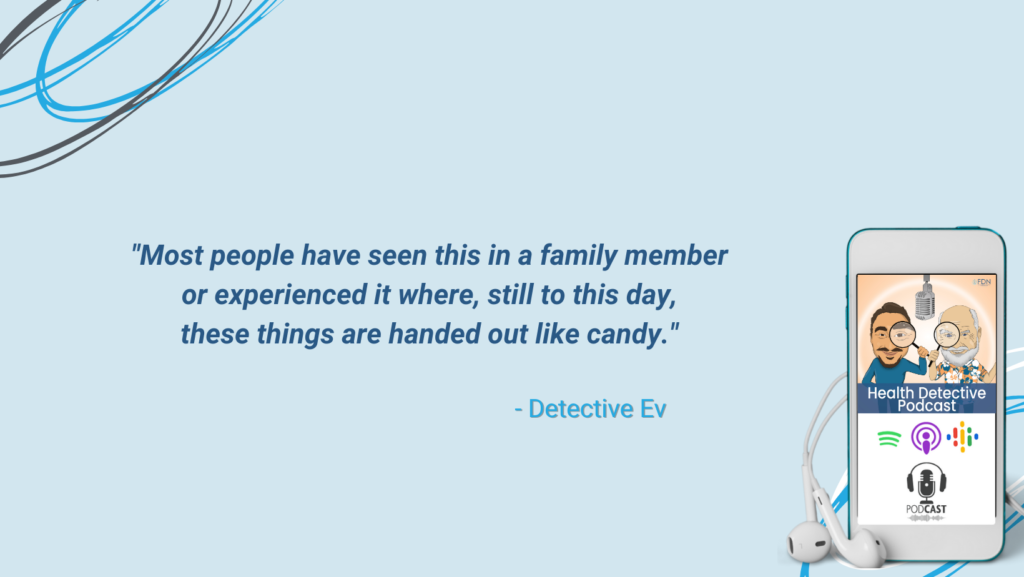
Most people have seen this in a family member or experienced it where, still to this day, these things are handed out like candy. My Type II diabetic grandma, she can go get Oxycontin like it’s nothing. It’s nothing. There’s no severe injury that led to this. I mean, she has knee pain. I’m not lessening the pain of course, but I mean, this has been years.
She is an addict to Oxycontin because of this. I mean, we could go, that’s again, that’s part three.
[00:52:37] Renee Bergmen: We could go all the way down the road of all the medications.
[00:52:39] Detective Ev: Still, I want to be respectful though, because a few extra minutes isn’t going to kill us here.
I took my opportunity to jump on the Enneagram thing and I know it does tie into the mental health thing. But is there anything else that you wanted to make sure we talked about today? Did you want to talk about the labs and how they integrate? Especially, I’d love to know where people can find you and just remind them like who you help and stuff.
That’s basically three questions. So, there you go.
Mental Health: Integrate Enneagram Testing in Your Practice
[00:52:59] Renee Bergmen: No, I think we’ve touched a lot on how different labs really help. I mean, the GI MAP is my favorite when it comes to this mental health conversation because the gut is just so integral in really making sure your neurotransmitters are functioning, all of that.
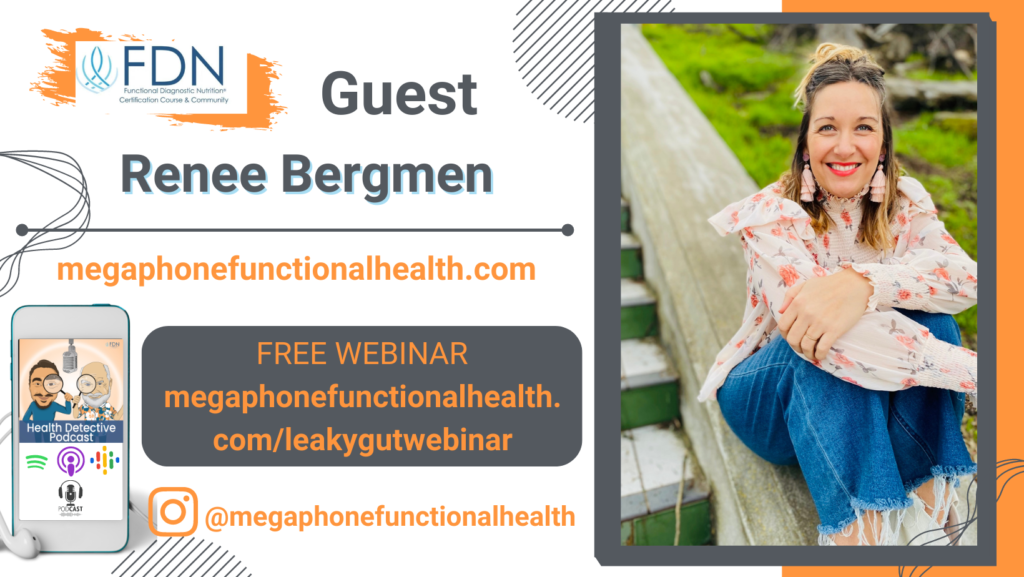
But I’d just love people to know Megaphone Functional Health. That’s where they can contact me.
I also love talking with people about the Enneagram. So, if you’re a fellow practitioner, absolutely reach out. I love the training that I’ve received. I have so many books that are so helpful.

When we were supposed to have a conference last year, I was going to be presenting on how FDNs can integrate this into their practice, but we didn’t have one. So, let’s hope we get another conference going. I’d love to give you more info on how to just really use something like this in your practice and see people really flourish.
[00:53:47] Detective Ev: Renee, I’ve asked you the signature question before, so I’m not going to repeat that. You don’t have to, I could even edit this part out if nothing comes out, but do you feel inspired to give any piece of advice, maybe specifically to those suffering with mental health right now? Maybe some final last words for the podcast today?
Final Words About Mental Health
[00:54:02] Renee Bergmen: I think anyone suffering with mental health issues be willing to be honest about what that looks like. Be honest with someone that you feel safe with and seek out the help with someone alongside you. I think mental health really is something that you’ve gotta have someone that’s going to be your cheerleader in it and going to help you navigate through it.
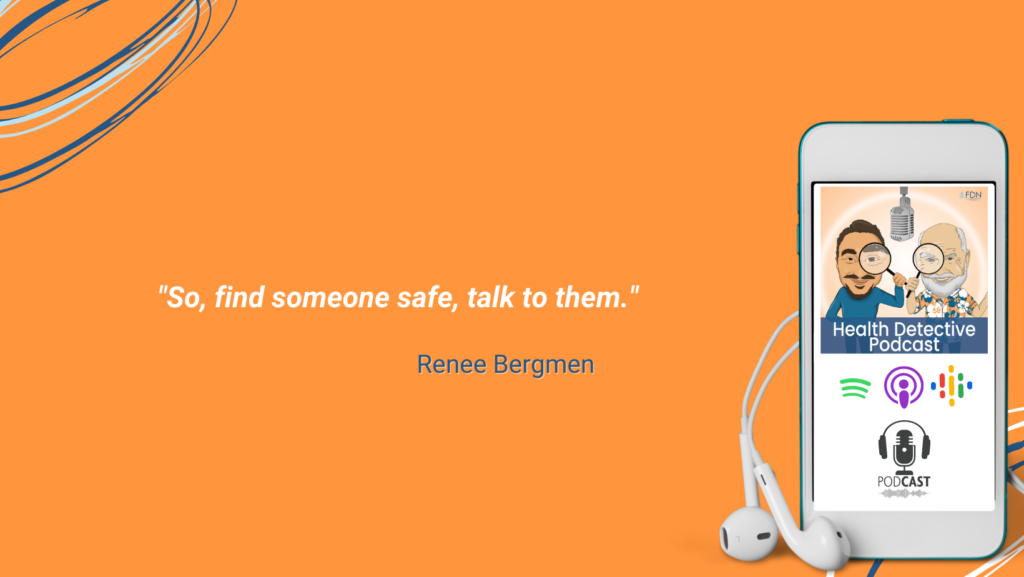
Because some of it can feel so dark and you can feel so foggy when you’re trying to figure it all out. So, find someone safe, talk to them. Try and find a practitioner that can really get to the root of things and a great counselor that can help you deal with some of the root issues.
Conclusion
[00:54:40] Detective Ev: Okay, friends. That’ll do it for today’s episode with Renee Bergman. I hope you guys enjoyed that one as much as I enjoyed recording it. I love when there is rapport already and you just go back and forth with the guest because sometimes you don’t even need to really understand the topic that the two people are discussing for it to be interesting. Again, I said this in the beginning, there is something, in my opinion, very contagious about passionate people.
I hope you guys like this one. With that all said, if you like the information that we’re sharing, please consider leaving us a five-star review on Apple and or Spotify. If you guys would be so kind as to do that, we would love you even more than we already do.
I will talk to you guys again soon. We’ll be back with another interview, but until then, please take care.
You can always visit us at functionaldiagnosticnutrition.com.
To hire a coach, go to fdnthrive.com.
For a Free Health Review, go to fdnthrive.com/match/.

